#which of course stems from racism
Text
"im a leftist, and i think someone being born a certain way doesnt determine their entire life, which is why i assume everyone with a southern accent is stupid and call them trash if they cant afford a house"
#so tired of people acting like an entire group of people are all exactly the same because of a stereotype founded on classism#which of course stems from racism#youre not a leftist if you do this shit#or idk maybe you are yall are embarrassing#i try not to bitch baby peepee boy on here but im cranky today
6 notes
·
View notes
Text
okay a few more danyal al ghul au memes because i think they're funny to make. with bonus yaelokre danyal memes!
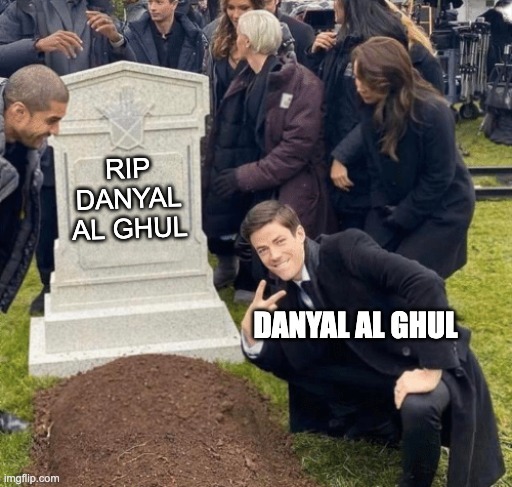
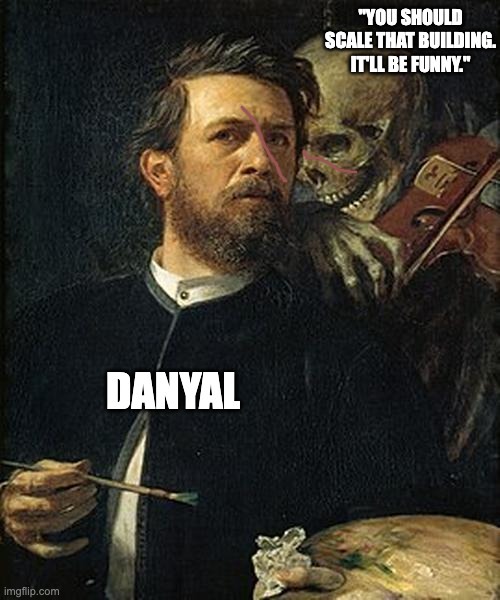
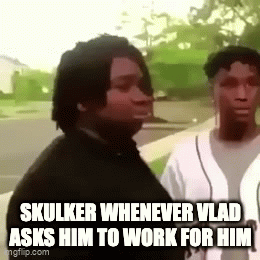
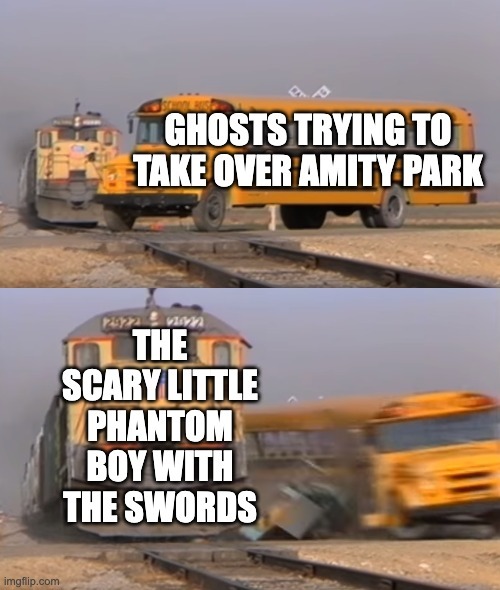
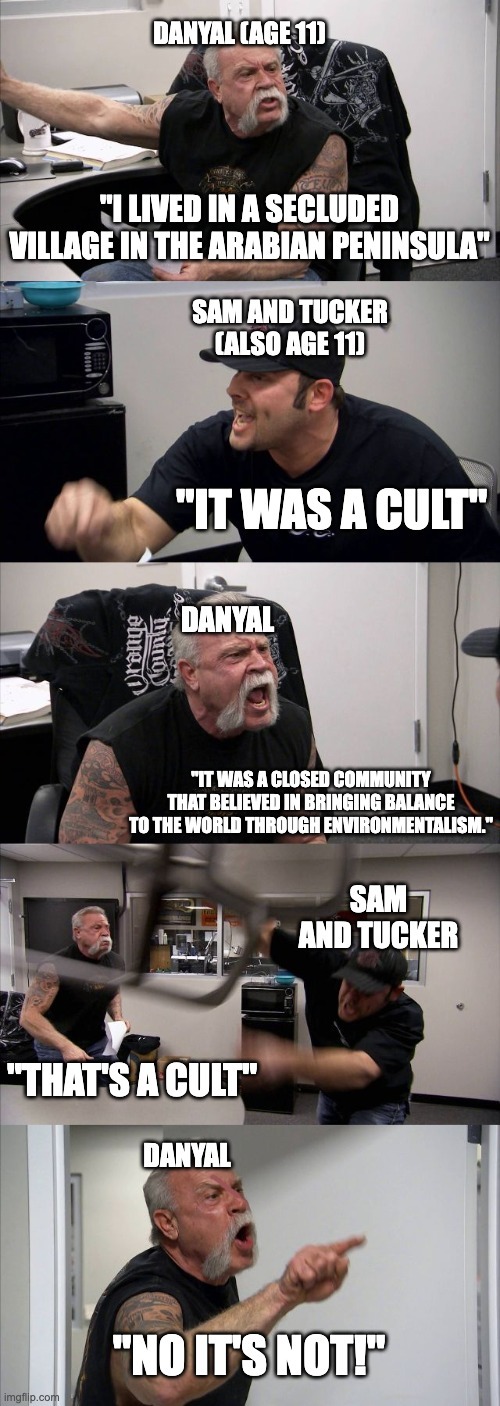
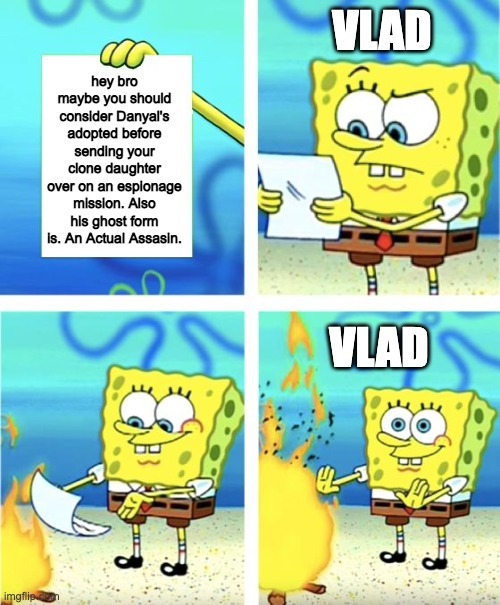
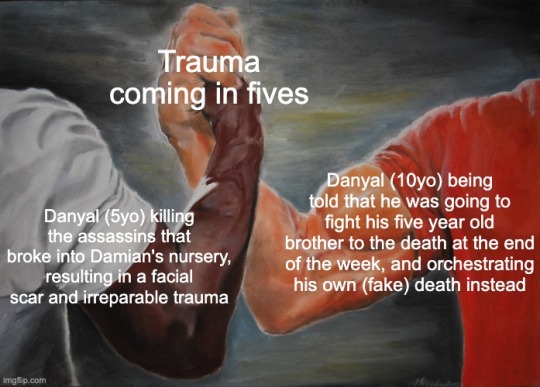
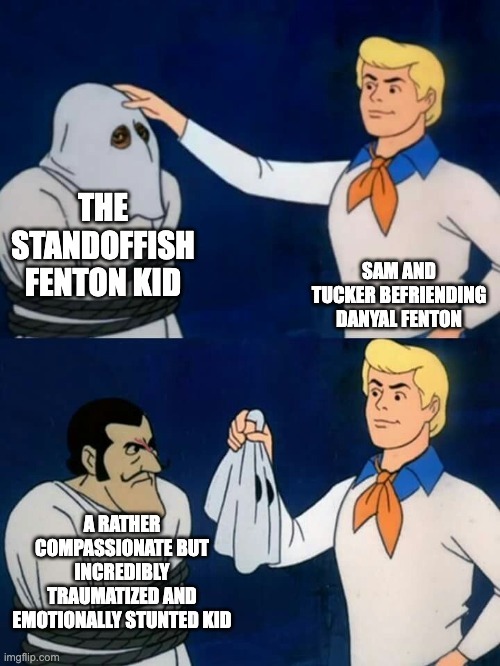
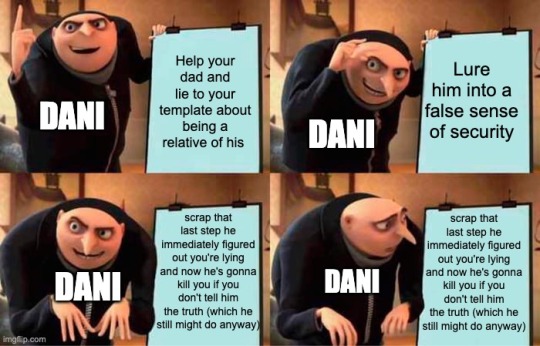
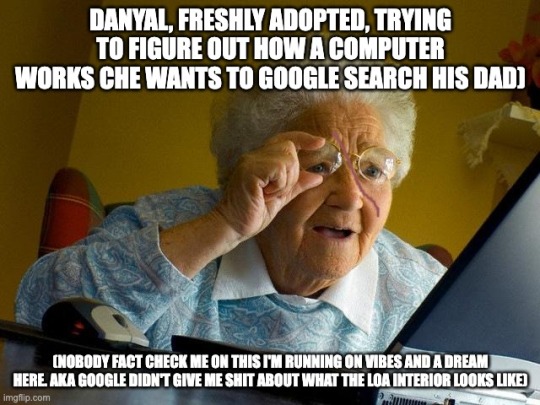
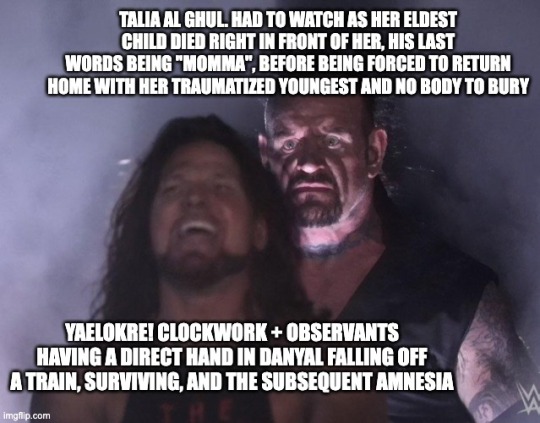
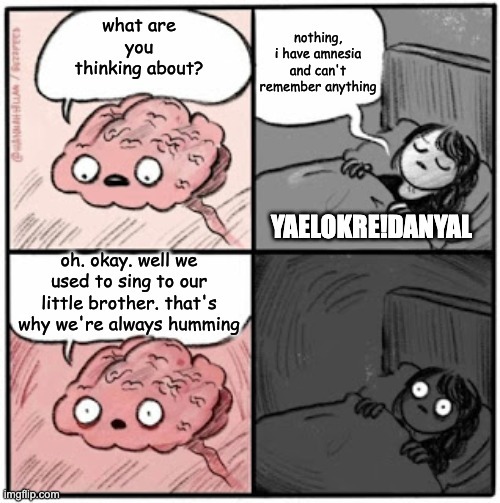
yaelokre! danyal 🤝 threes! danyal:
being five years older than damian
yaelokre danyal comes from my oneshot right here. however, i would frankly recommend reading the version i put on ao3 because it's been edited and includes more content! shout out to my boy, he's got amnesia </3
Do i think that the LOA has technology in it? Absolutely I do. LED lights but in 3000k warm white instead of the jarring bright sterile white, if they've got glass windows they're those solar panel glass panes my college natural science building uses that detects sunlight position, which in term controls the lights, which in turn saves energy. Amber lights for outside, solar panels. Just. anything environmentally sound and friendly, they've got it, they use it.
Do i think they've got computers and tvs lying around for casual recreational use? ....that i'm not so sure about. For this au? I'm gonna say nooooottt really. That stuff is typically reserved for like, mission planning, debriefing, research, etc. Frankly danny probably does know how to use a computer, however i thought it was funny if he didn't. so the meme is staying in lmao.
If they're not training, they've probably like, got a greenhouse or two somewhere on base they can help with. The LoA's whole thing is balance, harmony, restoring the natural world with extreme environmentalism. All that jazz. Probably plenty of ponds, recreational areas outside, gardens, just, stuff to do that's not technology based. My most basic understanding is that these people are the world's deadliest hippies. They can't be training all the time, that's neither good for morale nor for their bodies, so when they're not training... they're off doing shit. If Ras has kept this thing running for thousands of years then it’s gotta be pretty lit enough that nobody’s revolted lmao.
#dpxdc#dp x dc#dp x dc crossover#dpxdc crossover#danny fenton is not the ghost king#danyal al ghul au#danyal al ghul#amnesiac danyal al ghul au#yaelokre danyal al ghul#hey i finally came up with an au name for my main danyal al ghul au! oh man i have so many posts to reblog. its called#things in threes au#im a good mom talia truther nobody @ me. the villanization of her character stems from post 9/11 racism that's slowly being undone#and there's not enough good mom talia aus in danyal al ghul aus. not ones i've seen at least.#Ras is not an idiot if he's kept this organization running for millennia. If he wants his warriors to be in top shape they *need* breaks#they need high faith and good morale to prevent dissension. Which means good food. things to do. socialization. things to keep them *happy.#Too much exercise is just as bad as not enough and your body will forcibly shut down if you do not do it yourself. Ras can't have that.#of course there's always ruling with an ironfist and dictatorship. but the league would not have lasted as long as it has if that were the#case.#ras may be a shit grandfather in threes but its still up in the air for yaelokre#we’ll see where the wind blows for him. the au is still young
228 notes
·
View notes
Note
thoughts on anarchism?
The anarchists I've met IRL, especially while organizing, have been some of the most wonderful comrades and I wouldn't hesitate to work with them again. I'm sure there's many online too who're just like them. I do admire how quickly they are willing to use direct action, even if it's not the best tactic to be used or the only means to an end. Some anarchist ideas, while not necessarily achievable on a large scale, are certainly is very helpful for short term, small scale survival, like mutual aid for example.
Anarchism as an ideology though, I do have strong disagreements with. When I was first dipping my toes into studying political-economy, I had a very brief time where I was following both anarchist and marxist accounts and forums. And often, when I asked the marxists a question about how things would or potentially could work, they could point to real examples as much as they could theoretical ones, and they could point out the pros and cons of their own systems. But when I asked anarchists similar questions, there was generally a kind of hesitancy or wishy-washiness or vagueness which I really didn't get from the marxists. As a poc, I remember a black man had asked anarchists what the solution to a group of racist factory workers voting him out of their work force was and no one had any answers beyond, "well at that stage you really wouldn't expect racism on that level". But the marxists would say racism is a social ill that takes time to combat, even after the revolution thus the proletarian state exists to ensure cases like that are investigated and corrected. A more poignant example would be like the Chinese trans woman who sued her former place of work for firing her for being trans and the state sided with and supported her rights. In some ways, I think I was always inevitably going to go down the marxist route given my family background, but that's not to say I didn't give anarchism a fair shot in the beginning.
More theoretically, the roots of anarchism has always been deeply entwined with petite bourgeois ideology. Similar to liberalism, it supposes that the liberation of the collective comes from the liberation of the self. That's not to say anarchists are liberals (well, actual anarchists anyway), but rather, has been influenced by a deeply individualistic ideology like liberalism. The reason we marxists tend to call anarchists idealists can mainly stem from our biggest disagreement, which is the utilization of the state. It's unreasonable to destroy the greatest tool a class has in the class war once that class gets its hands on it, especially since the bourgeoisie have no qualms about using it as a bludgeon against the proletariat. The state has always been used as a mediator for class warfare and whichever class controls it controls the arbitration on class conflict. Like it or not, revolution, just like the construction of socialism, will come at different times with different arising conditions for every country. It's simply not enough to rely on hopes of either a total revolution or to defend your own revolution without the tools provided by a state. After the October Revolution, the nascent USSR was invaded by over 20 foreign countries and they threw them all out. During the second world war, more than 4 million fascists were killed on the eastern front and the Red Army marched into Berlin in the end. Both feats would be impossible without strong state apparatuses. There's more to it than just this, of course. If you want, you can read a (admittedly, pretty scathing) critique by J.V. Stalin, Anarchism or Socialism?, for some more detailed information.
My last point is that in many online spaces, there's no doubt a big overlap between radlibs and anarchism or at the very least, anarchist aesthetics. I can't tell you how many times I've been called some slur or 'tankie' or some variation of the two by someone presenting themselves to be anarchist who then turn around and say the most unbelievably liberal talking points. I've now come to realize that the reason for this overlap is two-fold. The first is that in liberal democracies, where individualism is extremely strong and thus anarchism, as a more individualistic ideology, appeals more to radlibs. The second is that anarchism is very easily marketable, even more so than marxism. These two kind of go hand-in-hand as well.
In the west and usamerica in particular, we don't have much of a choice in regards to who we side with and I would actually take an anarchist comrade over the "queering the MIC" libs in the DSA or whatever. I'll still jest about about anarchism tho.
278 notes
·
View notes
Text
wyll, in my opinion, gets the standard fare treatment for characters that are unequivocally good. i.e. people think he's boring and uninteresting. standard fare might be kind actually given the level of racism and unexplained slander (which is often just more thinly veiled racism). his reputation about being boring is not helped by the very blatant neglect of his storyline post his rewrite and release. as a wyll enjoyer i am hyperaware of the sorry state of his current story in all three acts
despite all of that and the glaring flaws - i still believe that wylls storyline is worth of being engaged with and explored.
one of the reasons (not the most major one, but one) i think wyll experiences so much neglect as a companion stems from a wider idea that "goodness" is always the uncomplicated, easy choice.
it's something i see a lot. wyll is boring because of his archetype as a princely and universally righteous guy. and this is interesting, because it always seems to functions under the assumption that wylls moral character is innate. that his heroic and righteous actions are in some capacity, uncomplicated.
uniquely among the male origin companions, through the course of wylls story - there is never a point in which he is at risk of making a truly 'bad' choice. both gale and astarions story have them at risk of making choices that are ultimately bad for them and others (especially tav when each character is romanced). gales godhood and astarions ascension are their in game moral failings. they are the result of having not broke the cycle and are 'bad' choices for the individual character.
wylls main choice is however his pact and the choice to break that pact. notably - wyll is never at risk of making a bad choice, only a selfish one.
from the critique i see of wyll - it seems like this is the element of him people find most egregious. he's too smooth, not rugged enough, not gritty enough. but i don't think wyll's character needs grit, necessarily.
if you take any time to dissect wyll at all, based on dialogue and character interaction, many of his choices put himself at the forefront of sacrifice. the game strips wyll of a lot of agency, but wyll also always abides by and sticks to his core belief. so often towards his own detriment.
not only does wyll bear the consequence of being turned into a devil (stripping him of the last remaining shred of identity he's ever had and one of the most important things in his life), he bore the burden of being banished when he made his pact, and was willing to do the same for the sake of his father when he is taken to moonrise.
and unlike gale (who i adore, to be clear) who's concept of self-sacrifice stems mostly from a low self-worth - the belief that dying is the best he can do - wyll truly views that it's better him than them.
wyll does not think twice about allowing himself to be the one to take the fall. he can play any part, take any role, even when these choices haunt him so obviously. wyll claims that he forgives his father, but opens up to you about fearing his feelings of missing him are one-sided. he believes that making his pact was the right choice, the one he would make again - but doesn't deny the obvious pain and solace that came along with being a wandering traveler and banished son.
wylls goodness is so deliberate. he is so staunch in upholding and acting on his beliefs that it is always narrative to his own detriment. when you view wyll like this , and view his choices with regards this character attribute, it is imo very hard to hate him.
wyll's goodness is his double edged sword. it makes him heroic, brave, fearless. and it makes him scared, uncertain and lonely. again, the story itself is bare bones and i understand that - but it is so very beautiful to me thinking of him and tav or just his general romance.
as wylls romance partner, encouraging wyll to break his pact is as tragic as it very beautiful. tav is wylls one selfish thing. one of the only reasons that would move him to not give himself up. one of the only reasons he is okay with forgoing his beliefs. he loves tav enough to break his own oaths, and make choices for himself and no one else. not as the blade, or as a ravengard - but just as wyll.
and that aspect of him is in my opinion, enforced, by the mindflayer tav ending. in which wylls monster-hunting and morals are made exceptions with / for tav. my enjoyment of hero corruption might be speaking for me, but i digress.
in every way though - i truly love wyll as a character. and while im well aware of the critical flaws in his in game story state, i think it's both unfortunate and unfair that people call him boring. to me he is anything but
#aristotle.txt#wyll ravengard#bg3#wyll meta#bg3 wyll#wyll x tav#he is so love of my life coded#this is my experience as a deku defending and lover speaking for me i fear
270 notes
·
View notes
Text
mentioning LOST's church ending got me riled up about the racism in LOST again lol. i obviously am aware that some actors just did not return to production for possibly other reasons, but also especially in the case of harrold perrineau (michael dawson) he felt like his character (and walt, his son) was treated like shit by the writing. and he was absolutely right. i've already made posts about this (will try to dig them up later), but michael was treated absolutely bullshit and unfairly wrt the story. michael betrayed them and killed two people, yes, but what did he do it for but to protect his son? he felt like nobody gave enough fucks about walt and there was some truth to that claim. his whole character arc is about being a dad to walt and their improving relationship over the course of being stuck on the island, so of course he would do that. it just makes sense.
which is why i don't think it's all that fair to punish him for it immensely in the narrative. harrold perrineau said it himself that he didn't want michael and walt to be another case of the absent black father stereotype [citation needed, i'll look for it but he said it in an interview] yet that's what he ended up being anyway. after his and walt's escape from the island, apparently walt cast him away because he doesn't agree with what his father did—which i actually think its interesting to explore: walt disagreeing with michael's actions and trying to grapple with it, but i don't think separating him from his dad was the best writing choice to make. walt is being punished for caring about his son by making his son be the one to cast him away. you can argue it's supposed to be tragic, michael is supposed to be a tragic character, but with the context surrounding michael's character? there's better ways to make his character be tragic than this.
which brings me to his next punishment. i was happy to see michael again on the kahana (just happy to see him in general), but it didn't last long when he gets killed, sacrificing himself to prevent/prolong the kahana's explosion from happening. (put a 📌 on this bc it's similar to how sayid dies and we'll come back to that later.) michael dies here and walt doesn't know about this. and then michael joins as part of the whispers, his soul trapped on the island (presumably forever) and that's why he's not in the church ending.
i'm gonna be frank. michael being trapped on the island because of his guilt or remorse or perhaps repenting for his sins is just bullshit to me. a lot of characters seen in the flash sideways and in the church ending are characters who've done "bad things". it's bullshit to have michael be the only one doomed to pay for his misdeeds forever. his misdeeds for... killing two people. not that killing two people is Nothing, but moreso if you examine the circumstances it's hardly anything to be damned eternally for.
remember the 📌 we had wrt sayid and michael? both of them died trying to prevent an explosion from reaching everybody else. which makes this more egregious imo. i can say 1000 things about sayid's arc (points to url), but this is about michael and not him, so i'll just focus on this: sayid was grappling with "being a bad person" for torturing and killing so many people. he worked as an assassin for ben. and yet, somehow, you're telling me sayid is not being damned eternally for his misdeeds but michael is? if you don't see the BS in that i don't know what to tell you.
i'm also aware why some characters don't appear any more re:conflicts with their actors (or just availabilities or other reasons for declining to come back), but even then arguably any conflicts with harrold perrineau stemmed from a justified place because of how michael was treated.
i think mr eko had a more dignified arc (he's one of my fav characters, thematically speaking) and honestly he had some of the rawest shit i've ever heard:
I ask for no forgiveness father for I have not sinned, I have only done what I needed to do to survive. A small boy once asked me if I was a bad man, if I could answer him now I would tell him, that when I was a young boy I killed a man to save my brothers life. I am not sorry for this, I am proud of this. I did not ask for the life that I was given but it was given none the less, and with it I did my best.
but despite this it doesn't change the fact that his absence in the church ending is very noticeable. he had meaningful connections with charlie, with locke, and interestingly like michael he kind of parallels sayid but this time thematically through their arcs. sayid is constantly burdened with feeling like he's a bad person and resigning to it as some sort of self-fulfilled prophecy, but mr eko is very firm about how he sees himself as not necessarily a bad man, just a man whose hands were forced because of the cards he was dealt. i wish we could have seen a more direct parallel between them, because it would've been interesting. back to the main point: i think it's such a missed opportunity for mr eko to not be here. especially since even after his death, hurley was able to communicate with his ghost, showing that he still had connections with his fellow losties even long after his death.
ana lucia being "not ready to move on" is interesting. but ultimately you can't help but raise a few eyebrows at it anyway. you can argue that, unlike mr eko she died an unresolved death, but most of the LOST characters died with an unresolved death. (she was killed early.) that's the whole point of the sideways segments. so what makes ana lucia so different from the others? yeah she killed shannon, but that was completely a freak accident. her people (the tailies) were being picked off one by one by the other so she was understandably on edge. she was kind of a hated character but i think a lot of it is just racism and misogyny combined tbh. (LOST is...notorious for a lot of misogynistic character writing decisions.) ana lucia was just as complex and morally "ambiguous" as the rest of them. i find the decision to make her corrupt in the sideways segments interesting (negative). cz like, there was never any indication she was like this in real life. what does that corruption symbolize? because obviously that corruption is a key to why she "can't move on yet". what exactly is she supposed to be repenting for? they hinted at a possible direction her arc is going towards before killing her off, ie. her ultimately choosing not to kill "henry gale" because she no longer wants blood on her hands. again, in a way, she's just like sayid! someone who decided they'd turn away from ceaseless violence. only right afterwards she got killed. so what does she need repenting for so much that she's left out of the church ending? much to think about.
i don't really know how to conclude this post. but my main point is that the lack of these characters during the church ending is and has racist implications. (again, i understand the casting issues, but it's still a writing decision you can critique as a viewer at the end of the day). i'll try to find the old posts i made last year abt michael and mr eko and their parallels to sayid and link them here (and self reblog).
edit: go read/look up "burn it down". it details a lot of the behind the scenes mistreatment of the staff (including racism and sexism), including actors and writers. the quote from an interview from harold perrineau that i mentioned was also linked in a reblog. (post link)
#op#lost#lost abc#abc lost#lost 2004#<- have we agreed on a main tag yet#michael dawson#mr. eko#ana lucia cortez#meta#analysis#media analysis#church ending#//#lostposting#<- my tag for LOST rambles on this blog
82 notes
·
View notes
Text
Harad Through Fandom Eyes
Plenty of people acknowledge that LOTR's Haradrim, Easterlings and Variags are racist. However, I've seen less discussion about how fandom adds even more racism into the mix. This seems to be mostly because many people have very little knowledge about West Asia and North Africa, aka WANA [Why say WANA/SWANA instead of Middle East?] and what anti-WANA racism looks like.
I'm going to focus on Harad because this is the region that we know the most about. If you need a brief refresher:
Harad, or Haradwaith, is the region south of Gondor. There's a long history of violence between Harad and Gondor which dates back beyond Gondor even existed, to when Numenorians colonised Harad and repressed the people. Since then there were multiple wars and for long periods of time Gondor occupied parts of Harad. The Haradrim fight for Sauron in LoTR, partially due to their hatred of Gondor.
Harad is divided into two. Near Harad is strongly North Africa coded, and Far Harad is sub-Saharan Africa coded.

(Image description in alt text.)
Tolkien uses multiple different names to refer to the people of Harad (Haradrim, Southrons, Swertings, etc.) However, these seem to be the people of Near Harad, who he differentiates from the people of Far Harad. (There's some serious anti-blackness in this next quote, so skip over it if you need to. I only put it here as evidence that the use of Haradrim/Southrons in LOTR refers to Near Haradrim.)
[...] Easterlings with axes, and Variags of Khand, Southrons in scarlet, and out of Far Harad black men like half-trolls with white eyes and red tongues.
- Return of the King
There is more to say on this than I would be able to fit into this post. There's a discussion to be had about Tolkien's textual and real life relationship with Black people. There's also a discussion that needs to be had about how Tolkien's racism is often excused with the idea that he was a 'benevolent' or well-meaning racist, a product of his time. It's an excuse that ignores the violence of quotations like this and the way that he wielded his whiteness against Black people in academia and writing.
I don't have time or space for those discussions in this post, but I want to acknowledge them.
What I want to discuss here is fandom portrayals of Haradrim. I'm not going to talk too much about the in-text racism, because that has been extensively covered elsewhere. But in summary:
The idea of the good white guys conquering the lesser brown 'Men of Darkness' is inherently racist
Tolkien's description of the Haradrim, such as repeatedly describing them as a cruel and warlike people, is also racist
The one paragraph where Samwise feels empathy for a dead Haradrim soldier does not lessen the racism.
With that out of the way, let's talk about fandom.
There's a gaping void in the information we're given about the Haradrim, so of course fandom attempts to fill the gaps. Fans often take inspiration from WANA. But many fans don't actually know that much about WANA and don't realise how much of their perception of it is based on racist and imperialist propaganda.
In fannish depictions, Harad all too frequently becomes an exotified fantasy that pulls from Western perceptions of WANA. Orientalist ideals of a mystical, magical, and yet dangerous place predominate the fannish idea of Harad.
The first thing that you should know about WANA is that it's an extremely culturally, religiously and geographically diverse place. If your depiction of Harad is entirely desert, or made of a culturally homogenous people with a narrow range of skin tones and features, you need to expand that. Equally, depictions of Harad as more 'socially backward' than other areas of Middle Earth stem directly from racist propaganda.
Too many stories write Harad as misogynistic and homophobic, often in direct contrast to other areas of Middle Earth. As many WANA people have pointed out, these kinds of sweeping generalisations are often specifically targeted at WANA because of racism.
Mysterious cursed objects from the 'far away lands of Harad', decadent sultans, the fetishization of cultural practices like belly dancing; these are all forms of Orientalism. Female characters may be sexualised, shown as seductresses or members of harems. (By the way, Westerners tend to have a very incorrect understanding of what harems actually are/were. They were the part of a Muslim household reserved for women and pre-pubescent boys. It was outsiders who perceived them as fundamentally sexual spaces and created the modern tropes of sexual harems.)
Male characters may be violent, cunning, greedy, dangerous and strange. There may be public executions and enslaved peoples, regardless of the complete absence of a textual basis. All of these things stem directly from racist ideas of WANA as 'barbaric' and 'uncivilised'.
In fact, Haradrim were once enslaved by Numenorians. They were victims of violent colonisation that continued into the days of Gondor. They have every reason to hate the 'Men of the West' and fight against them.
On a final note, the most major and dangerous WANA stereotype is the portrayal of WANA people as terrorists. This isn't a trope seen in Tolkien's works because it's primarily a post-911 phenomenon. But it's something that you must be conscious of if you're writing about Harad or other WANA-coded regions.
175 notes
·
View notes
Note
While I agree with most of your posts
I think bringing up grammar in song writing is just kinda weird
Like as long as a song isn't as egregiously grammatically incorrect as 'I'll do what I should have did' (thank you deacon blue) it just isn't a relevant criticism?
Even the song writer you respect most probably doesn't write their songs like an essay they can lose marks for. And that's a good thing! Songs would be a lot worse if writers were worrying about these things
It's just such a bizarre thing to bring up- and unfortunately it kinda makes your other points look less valid because it comes across as weird and petty and like you'll drag Swift for anything (Plus obsessions with 'correct' grammar is just rooted in abliesm, classism and racism- so yeah not a good look)
Plus bringing up your literature degree... like you never studied poetry? Which famously plays with grammar and sentence structure? Like that's inherent to the genre and while very little of TTPD is poetic, lyrics are still most similar to poems then they are to essays or journal articles
Sorry you just really hit a nerve here cos it's just such a ridiculous thing to bring up.
Okay, yes people don't write songs like essay's. However, they often still use determinable grammar rules in art.
You are keying into the difference between prescriptive and descriptive grammar rules.
The prescriptive rules are ones that you are most likely to find first listed in dictionaries or textbooks. Descriptive grammar rules contend with the dialectal differences and slang. In either case, rules and stipulations or exceptions are noted in various linguistic analysis of the demographic's dialect. Both subgroups of grammar are consistently evolving as the use of the English language changes over time.
Before I move on, I just want to say that I am well-aware of the deep history surrounding the debates on proper grammar. These debates, of course stem, from sociohistorical issues surrounding class, race, and ableist attitudes. You are correct. However, the academic conversation on grammar and linguistics has advanced dramatically into the subdivision of grammar-practices with respect to dialectal and cultural differences. I judge Taylor Swift's grammar as similar to my own, since she claims to be from my “neck of the woods.” Thus, I feel it is entirely appropriate for me to throw metaphorical tomatoes at her.
In the juncture of this difference on prescriptive and descriptive, I want to make that point that people who utilize the difference well often take prescriptive rules and bend them to fit their specific thematic point, thus the lyric forms to its set of descriptive grammar rules. These artists do it with such finesse and precision, unlike Taylor Swift, that it’s nearly awe-inspiring.
For instance, Kendrick Lamar uses many AAVE typical syntactical structures to make his music personalized art. He won a Pulitzer for it. Take, as an example, the intro to his song “Humble” in which he writes, “Nobody pray for me / It been that day for me” (2017). This is not grammatically correct according to the prescriptive grammar rules laid out in the 1940’s. However, linguistic scholars do not operate on so strict a pendulum anymore. Notice, too, that Lamar is not actually breaking any grammatical rules, only playing with the purpose and form of his syntax, when we take into account the dialectical intention with which he uses “it been” as a poignant use of the past participle form of the verb “to be.” Thus, the simple sentence of “it is” changes into the “it been” as a subjective call first to his cultural dialect and to the thematic gesture of the song. As the phrase “it been” leaves out the helping verb “have” which would put the phrase into present progressive tense should it be present; however, it’s noticeable absence as a stiff detraction from prescriptive grammar rules, focuses Lamar’s thematic point on moving the audience to mediate on the past as it intrudes on the present time. His use of language discrepancy between prescriptive and descriptive rules focuses recognition on his dialectal culture and on his main thematic point as it hinges on making sure to notice where you’ve been in life in order to stay humble and live with authenticity. He is a masterclass on descriptive grammar being used in such a beautifully artistic way that I am damn near in tears for his music.
Okay, moving onto to your point about poetry not being grammatically correct. You are quite wrong here, because poetry "plays" with syntax but it does not throw the rules out. Much like the example I laid out above, poetry does the same thing wherein it plays with prescriptive grammar in a thoughtful way that often ties into the moral or theme of the work. Poetry centers on a different form of syntactical methodology... yes, you are right. However, the emphasis is still on the necessity of understanding grammar structures like poetic feet, meter, rhyme scheme (etc). It's not a free-for-all. The best poets of the last 6 centuries have been some with the most linguistically precise sentence structure that I've ever read. I can give you examples, but if I do that this answer will become a million words long.
I am, however, sorry to have struck a nerve or come-off like a know-it-all. I was only expressing my frustration that Taylor Swift is apparently one of the biggest artists in the world and she doesn't even bother to ask a friend if the meaning of her phrases gets lost in excessively languishing grammatical structures. For instance, in her song “Chloe or Sam or Marcus or Whatever” she is stacking so many phrases hinging on coordinating conjunctions that the meaning of the phrase itself loses any poignant message. She writes:
Named Chloe or Sam or Sophia or Marcus
And I just watched it happen
As the decade would play us for fools
And you saw my bones out with somebody new
Who seemed like he would've bullied you in school
And you just watched it happen (Chloe or Sam or Sophia or Marcus).
In this stanza alone there are 6 coordinating conjunctions stacked together, interspersed with additional prepositional phrases and 2 extra relative clauses. It is the most egregious run-on sentence I have ever seen published before. I've seen better, cleaner prose in the work I've graded from High School freshmen. Not only could she have said it in less words, but the way she is writing it makes it drag on and on. The meaning gets lost, and any emotional impact is shut down because people get lost in the wordiness.
It’s a failure on her part, and it’s clear how just writing a run on sentence with no meaning is so much different than the way that someone like Lamar is masterfully arranging language to fit his purpose. It's offensive that she gets to make a million-billion dollars off so little effort.
Sorry, I wrote you an essay, but I am so incredibly passionate about writing. Also, I’ve been listening to Lamar a lot today because of his recent diss track, and it just reminded about how much of a lyrical genius he is. Sorry, I detoured into a rant about how cool he is too. And I need people to understand that I am not critiquing Swift because I need to dunk on someone in order to bolster my own sense of self-worth. I just want better mainstream art, and I want people to have better, stronger art with which to engage.
I did not mean to hurt your feelings. You are quite right that obsession with "proper" grammar is bullshit; however, I am not looking for some old fashioned "proper" nonsense. I want people to write like Lamar, with intelligence and passion while he bends the notions of grammar, not like Taylor Swift with obvious run-on obfuscated and stupid phrases.
edit: Also, good writers do actually worry about grammar. It has to do with illocutionary forces behind the phrases. The best among us knows the language inside and out, and that is why they are the best writers.
Edit 2: Also, I've been thinking about this, but what do you think literary and poetry critics do? You say it's bizarre to critique Taylor Swift’s poor grasp of the English language? Of course, I'm critiquing that... she's the one who calls herself a writer. I don't go around checking everyone's grammar, but if you call yourself a "good" writer and a poet, obviously expect people to analyze the words on the page.
#taylor swift#anti taylor swift#ttpd#kendrick lamar#the tortured poets department#ex swiftie#grammar is a legit way to critique song#chloe or sam or sophia or marcus#humble
46 notes
·
View notes
Text
How the hell did I learn about the 9th Amulet book through two brothers arguing in the backseat behind on a two hour plane trip from Arizona? I thought they were joking at first till I searched it up and it’s real and it’s coming out very soon. So after I learned that I decided to re-read the Amulet series up till 8 and decided to tell whoever is willing to read this my thoughts!
Clarification beforehand though, I do enjoy Amulet. It was one of my favorite pieces of media for a few years and even inspired me to create my own story similar to it. While I may come off a bit hatful and aggressive, I do like this series but that doesn’t mean I don’t have my fair share of problems with it
Books 1
So I’m going off the same rating scale that I use for movies so go check out my Trolls Band Together review to know what each rating means and just replace movie/film to with book. Anyways I give this book, 6/10. I enjoyed this book. This was the first graphic novels series I read and I was excited to know what happened next. I also loved how the robots and the robot house looked. I don’t have any problems with the first book. Primarily because it’s way too early to have any problems.
The reason why I rate it low though, is because while I enjoy it, it’s not my favorite. It didn’t do much to really impress me nor draw my attention. It did just enough to make me wanna see what happens next.
Book 2
With the second book I give it a 6.8/10 right between 6.5 and 7. Why? Well for starters I enjoyed the Elf plot line. To me, when I first read the series was much more interesting then the main one for some reason. This is the book where we meet Leon. Leon, for the most part was an interesting character. Not to mention we get some world building through him about the elf king and being a stone keeper.
Navin’s plotline, while useful to some degree, wasn’t my favorite. Of course it’s important but I was less invested than I should’ve. That might just have been a personal problem I have with Navin later in the series but we’ll get to that later.
My only problem with this is Luger. Now, Luger is a good villain and I found him intimidating when I first read the second book. I think my problem really stems from the fact that this is the only book where Luger gets to be a villain. This should be a book 3 problem but book 2 is where he is defeated.
Book 3
Book 3 was my favorite when I was younger and it still holds the place as one of my favorite amulet books in the series to this day. I give it a good 7.5/10. This book does a lot of things right in my opinion. I like the action sequences and the new information about Trellis backstory proving again that he is the most interesting character. I also found Rico and Enzo funny believe it or not. They are a fun addition to the party.
However, my problem was the robots. Miskit and Cogsly were just there most of the time. They didn’t really guide Emily like they were set up to be. I didn’t feel anything when they got captured. Which is not something you want your readers to feel when something bad happens. I also found Luger’s personality change strange. I expected him to be a bit more hostile and condescending after being defeated. Granted, you could argue it was the stone but still, it was odd.
Book 4
I have mixed feelings about this book. This is where certain problems that I have with Kazu start to show. First of all, I give this one a 7.5/10 as well. I was never sure if I should trust Max until the very end. I never understood Max. He was suspicious and I thought he had bad intentions some times and other times I thought for a moment maybe he did have good intentions for Emily.
I also like Alyson mostly because she felt much more real. She was fun and I liked her character. Leon, Rico, and Enzo have their moment, the prison break which I enjoyed reading. I also like the Elf racism while Trellis and Luger are at the prison. Granted, it’s brief but it’s to be expected and it does give some insight on what other people think about Elves. I also liked Vigo. I was glad to see another stone keeper on the good and he also came with more world building which I’m always glad to see.
However, Miskit and Cloglsy were both weak parts and I was confused about how everyone was dead and stone and Max’s agenda for a while. I had to re-read certain parts to fully grasp what was happening.
Book 5
Book 5 was a 7/10. I don’t have many thoughts. For one I am mad they split up the original party. Karen, Miskit, Cloglsy, and Leon felt like they were meant for more before they got shoved in the brook closet. Sure, Cloglsy is here with Navin but it isn’t much. I do enjoy seeing Navin and Alyson hanging out, that’s fun. Max’s backstory is sad..he tried helping his friend and her family from prison. Only for it to backfire horribly in his face and be thrown into prison for trying to be a good person. His hatred and need to revenge for his dead friend is such an interesting concept for a villain and he poses such a genuine threat and I love it.
Then there is the about the voice. I am not gonna lie, not a big fan of it. The reveal that the voice is the elf king felt odd and sort of out of place. I don’t know. I have mixed feelings about it.
Book 6
Max. Max, max, max. All I got to say is f-ck you, Kazu Kibuishi for screwing over such an interesting character. This book gets a 5.1/10. The utter and total whiplash I got when Max wanted to work with Trellis, Emily, and Vigo gave me migraines. There was no build up and it was so random. And his death, are the FUCKING kidding me. This just felt like a lazy way to write out a character. Max knew that Layra wouldn’t approve of his actions and that’s why he asked for forgiveness. Then he tried to justify with her and it’s such horse crap! No to mention, it was so fricking anticlimactic and just lazy!
I also wasn’t a big fan of Navin’s side plot. Also something reoccurring is that Emily is just there. She doesn’t push the narrative because she has no goals. She just does heroic stuff because she feels she has to. Not because she wants to. It makes her feel flat. Which is disappointing since she had potential to be great.
The reason why I don’t put this as a three is because the scene where they save the elves and Trellis announces himself to be the real king, is cool. Not to mention I liked Riva. She’s a character that had great potential. However this is not enough to save this book.
Book 7
Oh, firelight. You are the embarrassing sibling in the Amulet series. I give you 3/10. First off, one good thing I’ll say is I am glad we are continuing the theme of lost. Even if it feels weird, pacing wise. That’s it. That’s the only thing I really enjoy about this book.
First off I didn’t like Pil, Alyson, and Navin’s storyline. It was just there and it took up too much page time. Second, Gabilan. Oh, Gabilan. He was also just there. We get his backstory, he does some stuff and then he dies. He’s a plot device and while if you really think about it, everyone is a plot device, Kazu didn’t try to hide the fact that he is a plot device. Also the ending. TRELLIS. YOU ARE TELLING YOU DID EVERYTHING TO TRY AND STOP HER FROM BECOMING A BIRD! WHAT THE F—
Book 8
Where do I begin. First off, this book was a 0/10.
And now my problems. First off the si fi outer space plot like win Navin was so boring. Oh my god. I felt nothing. But that. That part was least of my concerns. My concerns was everything else. First of all, Trellis and Vigo got nerfed so easily that it annoys me. They stop the army and that’s fine, though they did it without trying. And that’s it for them. In the entire book. I have several issues with them shoving Riva, Trellis, and Vigo in the closet.
But my biggest issue is Emily and the void. First of all how the hell did she get out so easily. Was this even an issue if she just left without any problems any help. WHY DID SHE NEED NO HELP! If it was that easy to leave the void, why did it take people years to get out. What the fuck. Also what the fuck is with the future Emily bullshit?! TIME PARADOX ARE A THING KAZU. THERE IS A REASON NOT MANY PEOPLE DESL WITH TIME TRAVEL. Also who the hell is Moze’s dad?! Why does he have to her son?! Kazu, why?! You missed the mark by a landslide.
Also the elf king. WHAT. THE. FUCK. IT WAS SO FRICKING EASY TO DEFEAT HIM. JUST HAD TO TAKE OFF HIS DAMN MASK. TELL ME THIS. IF THE ELF KING WAS THAT EASY TO DEFEAT, WAS HE EVER A REAL THREAT IN THE FIRST PLACE?! NO! WE HAVE BEEN BUILDING UP TO THE ELF KING AS THR BIG BOSS SINCE BOOK 2 AND WE DEFEAT HIM IN THE MOST ANTICLIMACTIC WAS POSSIBLE ARE YOU FUCKING KIDDING ME?! NOW THE MAIN THREAT IS A BUNCH OF SHADOWS?! WHY?! WHY! AND IF YOU TELL ME THAT THAT ISNT WHAT BOOK 9 IS ABOUT IT STATES IN THE AMZON DESCRIPTION: “Emily finally understands the stone's power and what she must do to defend Alledia from the shadows.”
ALSO THE FACT THAT EMILY IS ALIVE SEEMS LIKE A NO BIG DEAL TO VIGO AND TRELLIS ALSO THEY JUDT LER HER LEAVE TO GO KILL A BUNCH OF SHADOWS ALONE?! ALSO OLD EMILY WAS THERE TO GIVE EMILY HER STAFF AT THE END. AGAIN, TIME PARADOXS ARE A THING KAZU.
Overall thoughts:
It’s obvious that Kazu Kibuishi wrote this story without a proper outline. What does that mean? It means Kazu didn’t know how he was going to end the story or the middle. He knew the beginning and instead of trying to figure out and plan the entire story, he wrote what he thought of right on the spot. When waverider comes out I will buy it and read it. I will also most likely rate it and write down my thoughts. Till next time though, if you actually took the time read this post and indulge in my thought process and ideas.
#amulet books#amulet#kazu kibuishi#emily hayes#Navin Hayes#prince trellis#Vigo Light#book review#this is a long post#when I’m passionate about something I talk a lot about it#max#ikol#waverider#ranty rant
36 notes
·
View notes
Text
When comparing types of oppression, there have been lots of good discussions about how they aren’t 1:1 comparable, but I wish it was a concept grasped by more when it comes to gender.
Topics like “transracial” made it abundantly clear to many that race and gender are not as directly comparable. Good posts have come out about how fatphobia and classism operate similarly because the ability of some to move their position on the spectrum is used to insist that everyone can, when that simply isn’t realistic. So there is generally more flexibility than race, but less than gender.
I know a lot of my ire stems from the chokehold RF spaces have on feminism, but I would really love for it to be more commonly understood that misogyny does not operate in the same way as racism—nor along a binary (neither does racism, but I digress), the existence of trans people automatically means your standing can change quite flexibly*, white supremacy views ‘stolen’ maleness/masculinity as a threat and so being perceived as a man can actually make your experiences in other areas of oppression worse so it doesn’t necessarily cancel out anything, and while identity is true and valid, societal perception unfortunately carries greater impact on your gender experience than your identity.
*this does not mean that transition is easy or accessible (accessibility of course then ties into other forms of ists and isms, predominantly classism—which, let’s be honest, is impacted perhaps most of all by racism), it means that when you do have access to transition, the ability to completely pass as cis negates the idea that your birth assignment is forever tied to how society perceives you.
It’s tiring that we can move beyond Cis Man and Cis Woman as the only gender experiences, but too often discussions stop at Trans Woman Like A Cis Woman vs Trans Man Like A Cis Man when these experiences are not the only ones or even the most common, and when operated exclusively in a vacuum, there is no consideration for how racism, ableism, homophobia, ethnic and religious discrimination, intersexism, exorsexism and more completely change the discussion of gender.
Gender is treated like the ultimate form of oppression from which all other forms stem, when really gender is so uncontainable that every other form of bigotry drastically changes gendered experience.
32 notes
·
View notes
Text
Character Spotlight: Nog
By Ames
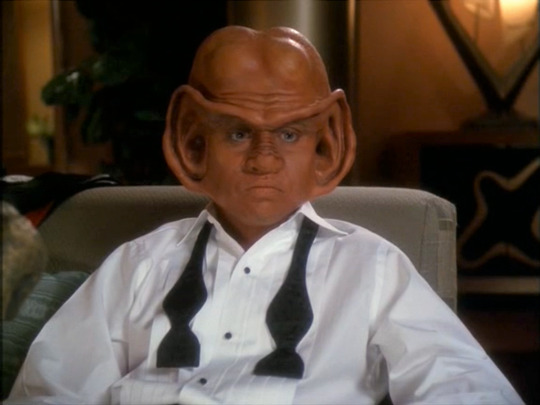
After some great blogposts on Quark and Rom, we’ve got one Ferengi left to shine the spotlight on, and that’s another of our fan favorites: Nog! Similarly to his father, Nog’s character arc over the seasons of Deep Space Nine is captivating to watch, as he grows from a little punk ne’er-do-well into a fully realized, complex person full of nuance and opportunities to learn. Which is pretty much DS9 in a nutshell.
So get prepared for some character whiplash, as we’ve got both childish pranks and severe post-traumatic stress disorder to explore in our blogpost below as we applaud the impressive versatility and range of the late Aron Eisenberg. Check out what your A Star to Steer Her By hosts have assembled as some of the young Ferengi’s best and worst moments, and check out our discussion on this week’s podcast episode (jump to 1:15:10 for Nog!). And there’ll be no running on the promenade!
[Images © CBS/Paramount]
Best moments

Vulcans stole my homework
As usual, we’re starting off with the good moments, and early on in “The Nagus” we see Nog get pulled from Keiko’s school out of Rom’s sheer racism. But what’s most commendable in the young Ferengi is that he sticks with it, secretly learning to read in the cargo bay with Jake and entirely subverting Sisko’s expectations and systematic racism against the Ferengi!

Maybe this isn’t a problem. Maybe it’s an opportunity.
While we gripe about how the Ferengi can be cartoonishly one-dimensional at times, there are times when their obsession with profit makes for good character and plot moments. When Nog encourages Varis Sul, Tetrarch of the Paqu, to view her land-rights situation in “The Storyteller” as a business negotiation, she finds a compromise everyone enjoys!
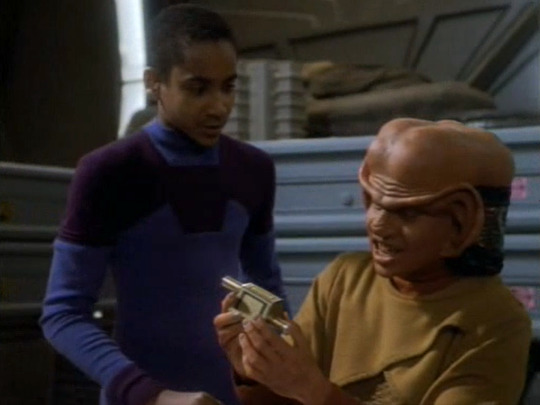
Say that five times fast
Speaking of Nog’s business acumen, he’s clearly still learning some of the basics in “Progress” but we still enjoy watching as he and Jake create their own Milo Minderbinder–like syndicate to sell yamok sauce and self-sealing stem bolts for what will turn out to be great running gags for years to come… not to mention tongue-twisters that frequently plague us on the podcast.

Because I don’t want to end up like my father
From what we know about Nog by the midpoint of season three (including some of the bad moments you’ll see below), it seems entirely random for him to want to join Starfleet as he says in “Heart of Stone.” But when he exposes to Sisko that he has dreams outside of making profit, of being something greater than his father, you really root for the guy and know he’s really going to do it!
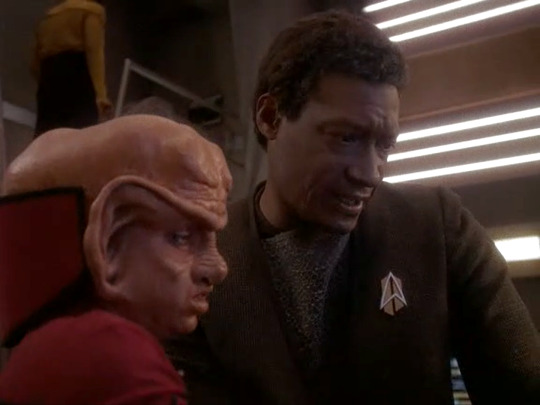
Best friends in subspace
When old man Jake Sisko is ready to embark on some outlandish quest to find his father, lost in subspace for decades, in “The Visitor,” there is absolutely no surprise that Nog is right there at his side in the Defiant, ready to do whatever it takes for his old friend. Sure, it’s an alternate future version of Nog, but the connection he has with Jake is as real as ever.
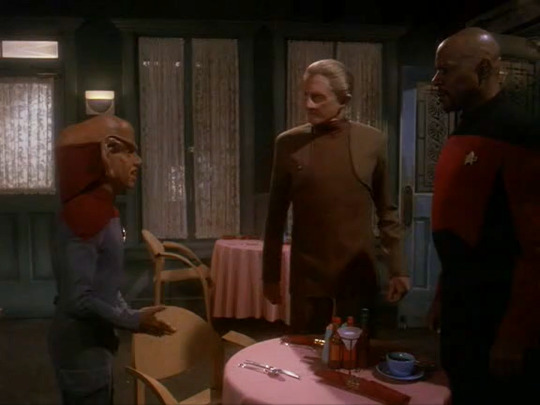
On Wednesday we wear red
Of course, Starfleet Academy is a challenge for Nog, who has set his sights on getting into the elite and extremely cliquey Red Squad to make a name for himself. But when it turns out that Red Squad is just a bunch of cadets being used by Admiral Leyton for his coup in “Paradise Lost,” Nog helps Sisko to find the truth of the matter, even if it is reluctantly at first.
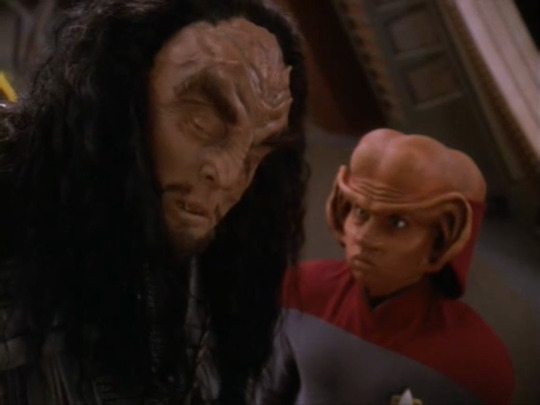
Not quite a Vulcan Hello
The B-plot in “Blaze of Glory” may not entirely gel with the A-plot of watching Eddington’s sacrifice, but it’s still some cute stuff for Nog. When he stands up to Martok after a whole episode of getting walked all over by the Klingons, you’ve got to respect the guy. As Martok says, “Courage comes in all sizes,” and it’s great to watch Nog tackle his problems head on.

Have a good day!
There’s just something about “In the Cards” that makes you feel good. Nog, being the best friend a kid could ask for, agrees to help Jake win his dad a baseball card, going so far as to loan all his money to Jake (I can hear every Ferengi screaming at that). And then the rest of the episode is them going around the station, making everyone have a genuinely nice day. It’s so cute!
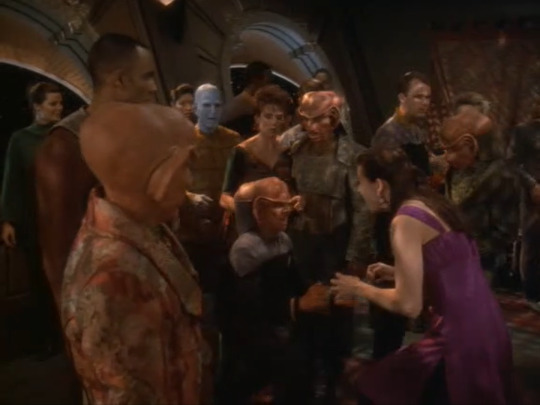
Boogie woogie woogie
Okay, Nog might only have one line in all of “You Are Cordially Invited,” but I just find him dancing with Jadzia at her bachelorette party just so endearing that I had to include it. Aron Eisenberg came up with the little Ferengi frog dance himself, and when Terry Farrell joins in, I find myself smiling every time. Thank you, Aron, for creating this adorable moment.
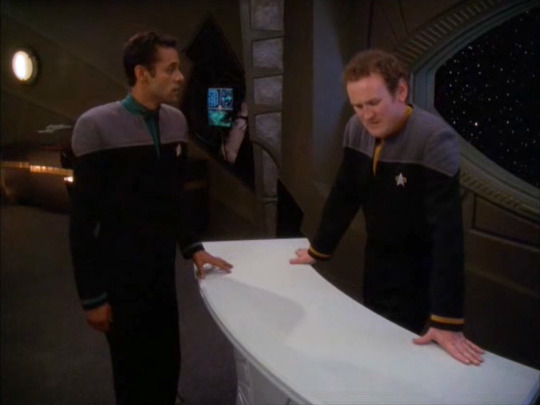
Have faith in the Great Material Continuum
So the whole Rube Goldberg device that is the chain events of schemes in “Treachery, Faith, and the Great River” may be kind of a repeat of the deals from “Progress” but it’s still very clever. After he joined Starfleet, you could almost forget that Nog is a Ferengi under the ensign uniform, but he pulls off deal after deal after deal to get the chief the stabilizer he needs.

We have a casino to build
While it is painful to watch Nog struggle with PTSD in “It’s Only a Paper Moon,” the way he knuckles down to assist Vic with his finances and to work on expanding the lounge into a casino is simply fascinating. It’s helping him cope, so that by the end of a brilliantly acted episode, he doesn’t even realize that he’s put himself on the road to recovery that is right for him.
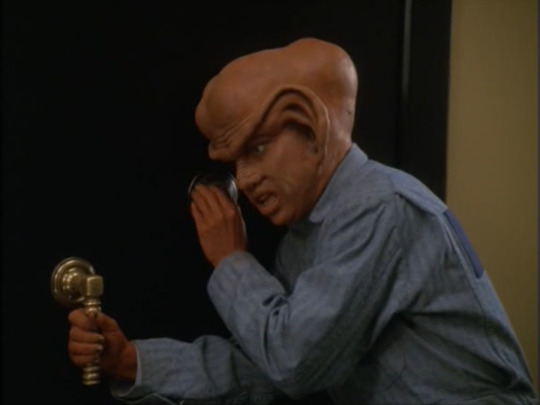
He’s not just a hologram, he’s my friend
Speaking of Vic’s casino, Nog is quick to pay back his holographic crooner friend for helping him recover by participating in the big heist in “Badda-Bing, Badda-Bang.” Nog’s part is to crack the safe in the countroom, and when he learns that it has an auto-relock tumbler that no one was expecting, he keeps his cool, gets to work, and helps the whole crew save the day!
—
Worst moments
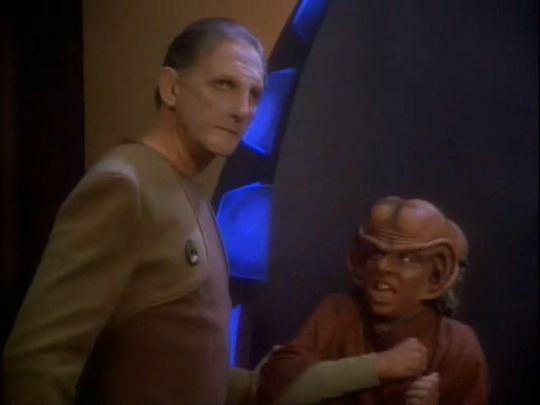
You never get a second chance to make a first impression
The very first glimpse we get of Nog in “Emissary” is him stealing shit (almost certainly at Quark’s bidding) and getting locked in the brig by Odo. He has all of two lines in the episode – “Hurry up!” and “Now!” – but he is immediately cemented as a bad seed under the thumb of his uncle. The show literally starts Nog off with such a bad reputation there’s nowhere to go but up!
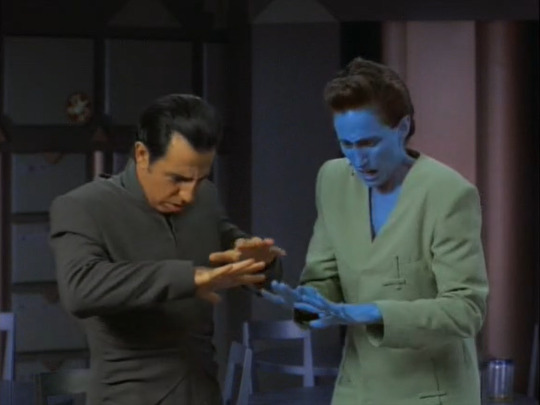
What this place needs is a school
Nog’s delinquent behavior doesn’t stop there. When he and Jake strike up a friendship in “A Man Alone,” it’s by sharing the experience of pranking a couple of civilians on the promenade with some Garanian bolites, which cause them to itch terribly and turn colors in a scene that legitimately looks like torture. It’s no wonder Keiko steps in by starting up her little school.

Buckets of fun!
We see another of Nog’s juvenile pranks in “The Storyteller” when he fills Odo’s bucket with oatmeal and dumps it on Jake who, utterly mortified, believes for a second that they’ve somehow killed Odo. It’s a little funny in hindsight, but at the moment it just seems cruel. Jake’s reaction of terror certainly helps that along, cementing Nog’s station status as a nuisance.
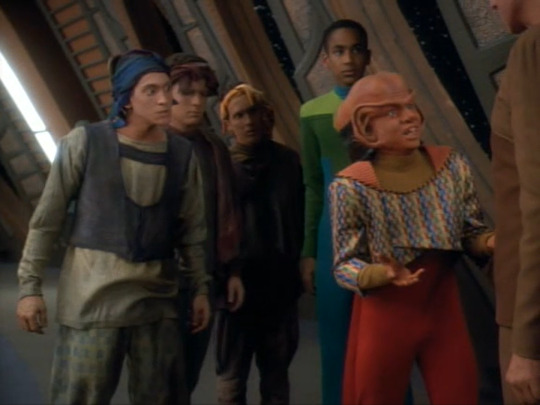
No running on the promenade!
There’s one more Nog prank to make the list! When he sprays some foul-smelling fluid on Tumak in “Sanctuary,” it causes a big fight to break out with the various Skrrean kids. Nog just can’t help himself. As if these refugee kids haven’t been through enough, they have this short, big-eared, froglike nuisance wreaking havoc for them. What a brat.
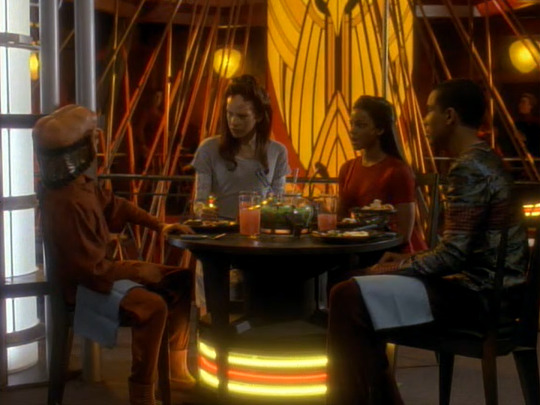
No one’s asking you to think, my dear
As we’ve discussed in Quark’s and Rom’s respective spotlight posts before, Ferengi culture is garbage, especially how they treat females. We see some of that come through in Nog in “Life Support” when he goes on a double date with Jake and acts like a complete asshole to Riska. He’s demeaning to her, he requests she cuts his food for him, and somehow Jake’s the one apologizing!
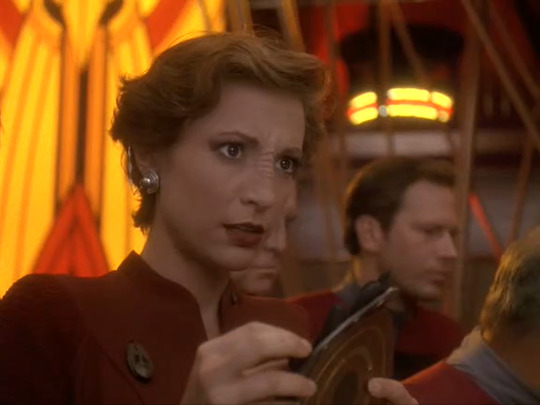
I’ve been looking for it for two years
Even when Nog has matured and joined Starfleet Academy, we get little reminders of the miscreant that he was from the start. At his coming-of-age yardsale, Kira discovers that Nog has had her lost springball racket all along and was attempting to sell it in “Little Green Men.” Sure, that was two-years-ago Nog, but he could have returned it in all that time!
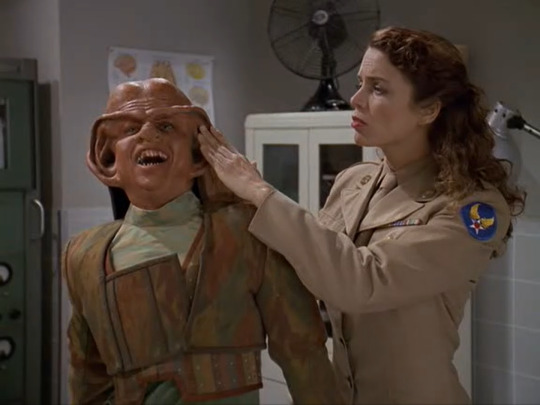
Could you massage it some more?
Across so many of these posts, every time oo-mox comes up it automatically makes the worst moments lists. So when Nog tricks Faith Garland into giving him oo-mox in “Little Green Men,” and not for the first time evidently, I find it abhorrent. Here’s hoping I don’t have to bring up such rapey behavior again for a while (at least until that one Ferengi episode of Enterprise).
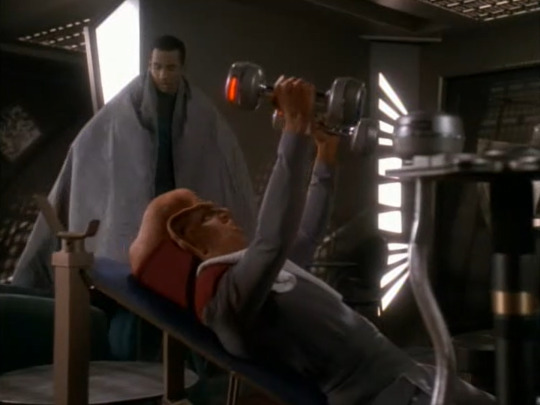
Healthy body, healthy mind
After a season or so at Starfleet Academy, Nog suddenly becomes a tightass. The conflict with Jake, now his roommate, in “The Ascent” is manufactured and trite – the kind of odd-couple antics of eponymous sitcoms. Nog is now a neatfreak. He constantly works out. He corrects Jake’s stories without permission. It’s like his character has been rewritten to fit a punchline, and an old one at that.
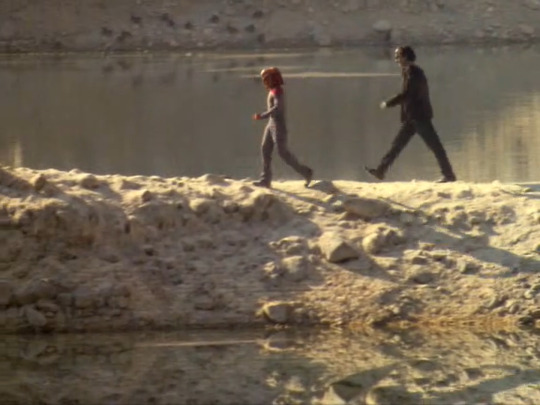
I won’t turn my back on you again
This one’s just a little silly peeve. After the events of “Empok Nor” when Garak’s little murder spree on the titular station, Nog vows to never turn his back on Garak when they’re out searching for supplies in “Rocks and Shoals.” But then after they get hostage-handoff’ed, he immediately turns his back on Garak as they cross the levy. Dude! What did you just say?
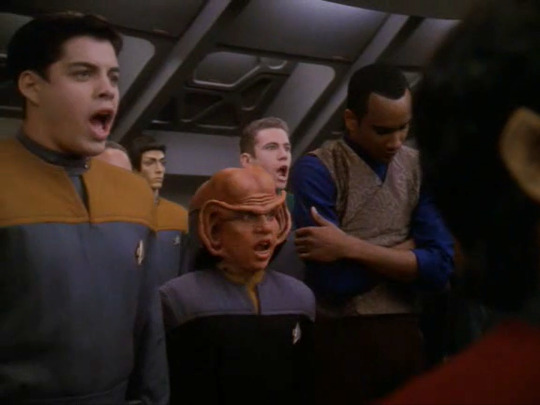
Red Squad, Red Squad, Red Squad!
Nog got tempted by the allure of the corrupt Red Squad in “Homefront” and “Paradise Lost,” but it’s in “Valiant” that he gets thoroughly taken in. Acting Captain Watters offers Nog everything he’s ever wanted: respect, rank, and some semblance of power, in exchange for his unquestioning obedience when the utterly impossible plan goes swiftly sideways. Gee, who’da thunk?
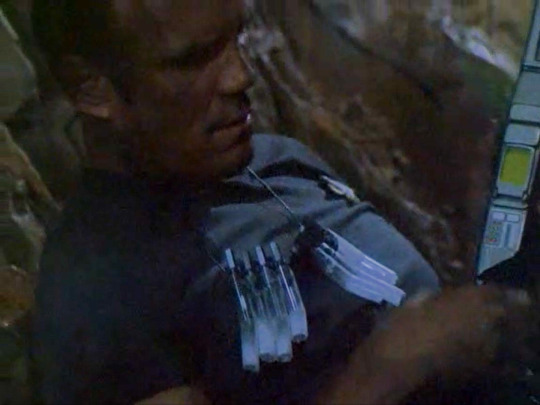
And you find that impressive?
The Dominion War sure brings out the worst in a lot of people. Sisko commits some war crimes. O’Brien is typically racist about the Jem’Hadar. And Nog starts to fancy himself a soldier, bent on killing the enemy. In “The Siege of AR-558,” he blatantly admires the Ketracel-white tubes that Reese has collected as war trophies, and Quark is all of us, displaying utter disgust at this.
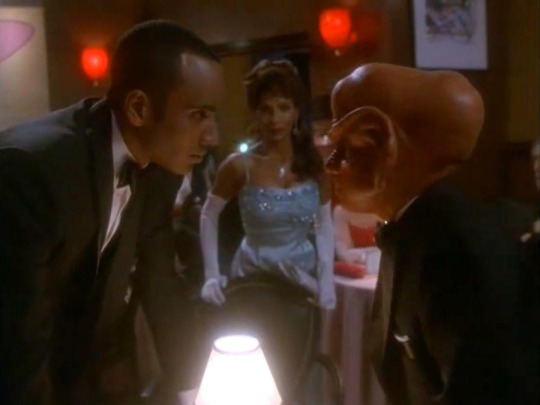
You don’t come into my club and start hitting customers
While we totally get that recovery from the loss of his leg is a struggle, that’s no excuse for how Nog treats his friends in “It’s Only a Paper Moon.” Living in a holodeck starts off as a way to not only avoid the people he thinks are staring at him, but to avoid helping himself get better through therapy and rehabilitation. And when Jake visits, Nog is rude to Jake’s date, and then outright attacks Jake in the middle of Vic’s set. Pally!
—
You’ve got a deal! That’s the end of the Ferengi spotlights (for now?), but we’ve got more great DS9 recurring characters to examine for the next couple weeks, so make sure you’re following along here. We’re also still plodding through the Xindi arc over on our watchthrough of Enterprise, so join us on SoundCloud or wherever you get your podcasts, and hail us over on Facebook and Twitter. Now say it with me: self-stealing stem– dammit!
#star trek#star trek podcast#podcast#nog#deep space nine#the nagus#the storyteller#progress#heart of stone#the visitor#paradise lost#blaze of glory#in the cards#you are cordially invited#treachery faith and the great river#it's only a paper moon#badda bing badda bang#emissary#a man alone#sanctuary#life support#little green men#the ascent#rocks and shoals#valiant#the siege of ar-558#aron eisenberg
11 notes
·
View notes
Text
Izuku is such a weird character when it comes to a shonen fandom, bc not only do his stans and antis completely misunderstand and fanonize his character, but they also end up pushing misogyny and homophobia onto him too.
On one hand, you have Izuku the smol boy. He needs to be protective, he’s nurturing, etc. overall he posses more “feminine” traits bc people want to fit him into a specific gay stereotype. Sometimes people even mix this up by making him more “feral”, when people knowingly make him ooc, but end up actually making him MORE accurate than if he was the former. Because to them, gay men fit into two boxes: mean/creepy (Katsuki, todoroki, etc.) or nice/feminine. They view him and many other gay people as simple cookie cut out stereotypes that were a mixture of fandom culture and also propaganda going back decades in the US.
They don’t view him as a full fledged hero, nor a capable man and human being. Someone who is responsible for his own actions, masculine, etc. because if they actually did see his full CHARACTER, they could no longer see him as the gay stereotype they want him to be. People want to have heteronormative dynamics and relationships, someone always has to be the “woman” or “man” in the relationship. Regardless of the actual gender they are, they need to fulfill an agenda. And because deku cries a lot or was bullied and is often seen as weak in the story, he is automatically the woman in the relationship. It stems from both misogyny and homophobia.
But bkdk CONSISTENTLY defy that! They are defined by their masculinity. It’s seen as something positive to be, and dekus constant crying is never inherently seen in the story as feminine. I’ve seen time and time again where gay relationships/people are pushed into a certain role in a heterosexual relationship they are supposed to fill. Take Robin from stranger things. Now, I love Robin, don’t get me wrong, but the first time that we see IN OUR FACE that she is openly a lesbian and attracted to a woman, it’s with Steve. Steve is fine, sure, but the problem is that steve presents an immediate heteronormative narrative in the first episode of season 4. Going on and on about how boobs are great and that it’s not a bad thing to just say boobs, but this is child’s play. This feels inherently *heterosexual*. I’m a gay trans man, so idk if I can voice this for anyone, so I’ll just screenshot my sisters response.

(She’s awesome, love her to death. Really fucking intelligent too)
This heteronormative narrative that the mha fandom continuously tries to push is the same one that the duffer brothers use. Wills character has kinda been reduced to the fact that he pines for a man he can’t have, once again pushing a character into a female or a male in the relationship. Usually the lesbian or gay one.
This rule has exceptions of course, like Luz is reduced by her fandom as the masculine one. Which is not only rooted in homophobia/misogyny but also racism. Or raine as a nb character in a sapphic relationship being put into a more feminine role because Eda has already fit that narrative according to the fandom.
But it doesn’t change the fact that Izuku is not a “feminine” man. They want him to fulfill a role in their smut as the bottom in the relationship, he has to be sexual, etc. because if he isn’t, then they have to see him as a full PERSON. Izuku possesses “masculine” traits. He has the worst sense of style, has anger issues, gets a little nervous around girls, likes heroics (something that’s been established as being seen as “masculine” in the show), is a bit creepy, etc. and people seem to throw these traits out the window in fics or other media.

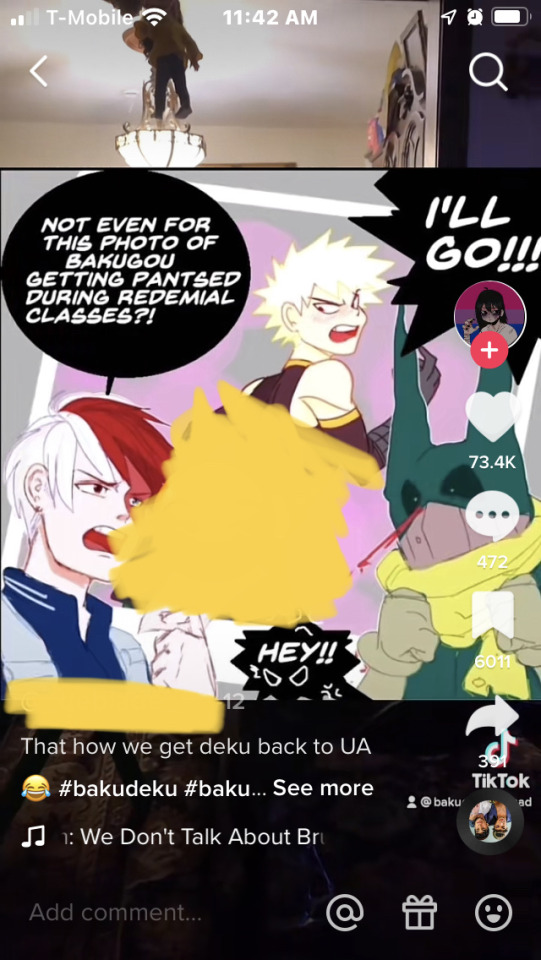
These are just a few things you see when you look up bkdk ALONE! There’s more too! These are full on adults a lot of the time too! Sexualizing a character that hardly looks mature either. It’s weird and entirely rooted in homophobia and misogyny.
And on the other hand, you have the dudebros. People who entirely believe that there is no way Izuku is gay in any light and disrespect anyone who does. On top of that they completely erase and or make fun of his more “feminine” traits in favor of pushing more masculine ones. They will erase any characters queer coding and call anyone weird for having a head cannon about a character.
They fully believe that Izuku should be a “real man” and beat up Katsuki, maybe tell him off, etc. because they too want him to fulfill a role in toxic masculinity no matter HOW MUCH this show calls it out! A lot of Katsuki’s character is based in toxic masculinity alone with deku’s. When deku bottles up his emotions like what he’s “supposed to do”, people think it’s normal or character development even.
They entirely lack both literary analytical skills and basic knowledge on the character you’re looking at. “Manga deku” does not exist. It was his vigilante arc and from start to finish it was never good. The story itself shows that this did nothing but hurt deku and almost kill him.
This is, once again, rooted in homophobic and misogynistic stereotypes and make an assumption of a main character based on other shonen animes. Deku is not allowed to be a crybaby or he’ll show emotions, Izuku is not allowed to have too close relationships with other male characters or it is a detriment to his female love interest, or even that Izuku is not allowed to ask for help in his battle with shigaraki. Even though, pushing the people he lives away was the entire reason all might and nana failed.
So, what, the point is that mha’s community on all sides is misogynistic and homophobic? PRECISELY. No matter which angle I’ve looked at any shonen community there is always always always at least half of the fandom consists of people who have zero clue how a gay relationship works. That it’s different from a straight relationship. And the fact that horikoshi is really leaning into the direction of bkdk being canon I’m gonna say that he’s well aware of this and wants to break it. Show a couple that is defined by their homosexuality rather than wrapped in a thin sheet of “heteronormativity” like many other shows choose to do. Namely, shows written by non queer people. Like the duffer brothers.
I only hope for the best when it comes to these two. They’ll definitely be a symbol far bigger than the mha community. Maybe even something for the queer anime community as a whole. And I’ll fucking love it if it happens.

#seriously though#can we stop being weird about Izuku#it’s already getting old and I want nothing more than to have him actively break stereotypes#I love him <333#mha deku#midoriya izuku#bkdk#bkdk brainrot#mha analysis#bakudeku#bakugou katsuki#bnha deku#deku midoriya#mha bakugou
289 notes
·
View notes
Note
so, after seeing ewan mitchell at the conference, i have a delulu headcanon of actor aemond x bipoc actress/classical pianist/voice/stem girlie reader. of course, she's south-east asian chinese because i am extremely delulu.
like ewan mitchell, aemond is also the most mysterious targaryen in all of his family members in the world of acting.
aegon is an actor but is known more as a social media star/personality whilst halaena is the cottagecore girl who does tiktoks.
luke and jace are nothing more than nepo babies. both got that arrogant attitude from their mother, 'nyra.
aemond, despite the loss of his eye, became quite famous because of his strong acting abilities, mentored by criston cole.
he then became the most sought after leading man in the westerosi entertainment industry and racked up several acting accolades, second to his uncle, daemon.
wanting to beat his uncle's records, he decided to create a show of his ancestor's history.
reader came along by accident. she did not intend to pursue a career in acting because she saw herself as a in the world of stem and classical pianist and singer, not as an actor. the only acting accomplishment she had was acting as a tree in high school just to make her report card look good.
but she ended up getting that job because, in her previous role, she was selected in playing the leading lady of a video game character after the casting director liked what she did with their latest mocap technology. she initially resisted because she did not believe that she had what it takes, as well as her lack of training, but the director insisted. this led her to win an acting award due to her gritty and raw performance as a character who desperately needed help.
criston cole recommended reader and aemond, who already had several years of experience under his belt, was quite impressed by her performance as a newbie and decided to give her the job.
reader decided to take the job after her grandma said that she has never once seen a face like hers in south-east asian television channels due to racism.
aemond could remember the first time he laid his eye on her. there she was, despite being a young newbie, walked in the room with the confidence of a performer. his eye then landed on her resume and, if he had to admit, he was quite impressed by her.
her extensive resume, as it turned out, was quite diverse. she had experience in animation, mathematics, IT, computer science, classical piano, voice, speaks multiple languages and knows self-defence.
the self-defence reader knows is bokator, which means, "pounding a lion" in one of the south-east asian languages she speaks. think black widow swinging on top of her enemies in order to bring them down. if aemond had to admit, he was quite impressed by her, as no one was able to match his acting intensity and throw him off his feet.
she was someone who was not hard to miss, as she loved to wear brightly-coloured dresses and bold red lipsticks. sometimes, she would modernised traditional clothing, making her even more beautiful.
despite her impressive accomplishments, she was actually quite kind and humble and was willing to mentor aspiring classical musicians and stem girlies.
he loved his deep conversations with her, as she talked to him about the parallels between the history of his ancestors and ancient china.
she was also quite kind and considerate with a bright smile on her face. despite her bright and cheerful character, she was initially quite guarded towards aemond and maintained their distance, as she respected his wishes for privacy.
aemond, despite feeling glad of her kindness, sometimes wished that she'd let her guard down around him.
despite this, the cast could tell that there was something brewing between them. they noted how aemond would smile and laugh a bit more around reader. how relaxed he was around her. how trusting he was of her.
things went normally between them for quite some time.........until he discovered her secretly dancing to BTS' Run.
aemond was just walking down the corridor when she heard the music blasting from the gym room.
there she was, lip syncing and dancing to BTS' Run, completely oblivious.
so, the prim and proper reader actually had a fun side. it was quite a sight to watch.
reader, who completely oblivious of him, finally felt as if that she wasn't alone.
the video of her screaming and seeing him lean against the door with his arms crossed and smirking became viral, leading to fans asking when is the kdrama coming out.
the PR and writing team began to take notice. the writing team then began to write a romance story line whilst the PR team made them sit together in interviews.
the romance was unmistakably sizzling, despite the fact that the two of them barely had any kiss/sex scenes, per reader's suggestions.
the world then began to notice this and started asking whether or not they are dating, which reader vehemently denied, stating that they are colleagues and that she does not do office romances, much to aemond's disappointment.
the two of them were then sent to the south-east asian country that reader used to live in. the studio's intention was to attract more fans from that country, as reader can speak their language/s. aemond's uncle, corlys velaryon, and brother, aegon, joined as well.
aemond stepped out in the outfit like the one ewan mitchell wore at the airport in brazil.
as for reader, she stepped out in her pilot uniform, sunnies and bold red lipstick, much to the crowd's amazement. there she was, standing there with a powerful and commanding aura. someone who should be messed with.
as it turns, the studio pulled some strings so that reader would fly the aircraft, as she had been accumulating flight hours in order to step foot into NASA.
aemond was then photographed trying out local cuisines recommended by reader. he admired the fact the way reader's eyes lit up when discussing the local cuisines, leading to many lusting further after him.
aemond's outfit was the same as ewan mitchell to tease the female audience.
as for reader, she went on stage with a modernised ma mian qun (horse skirt from the ming dynasty) with water dragon patterns on it and off-shoulder modernised traditional sparkly top. aemond could not take his eye off from her. bright colours definitely suited her.
on stage, it was quite clear that aemond speaks of her highly. he praised the fact that she was a wonderful actor who is filled with multiple talents. he bragged about the fact that she also flew the aircraft they were in, as well as switching to multiple languages on the aircraft in order to communicate to the different nationalities of passengers. he also speaks highly of the fact that she was able to sing several of the soundtracks with her extremely beautiful voice and strong pianistic capabilities, as well as having several theorems next to her name and pursuing a phd.
the crowd awed out loud because it was quite clear that he was completely in love with her.
aemond also admired the fact that she was speaking to the interviewer in her native tongue and other languages she had up her sleeve, something that he had never heard her do before. he made a mental note to give her roles where she could speak all of those languages.
aemond also admired the fact that she was able to speak about her role in depth, her strong and impressive musical abilities, passion for the ancient chinese history and parallels to his own ancestors' and discussing how she used her STEM skills and knowledge to create a good show.
she was then asked on whether or not she sees aemond as a potential real-life love interest, in which she laughed off.
interviewer: "when's the kdrama coming out?"
"it's never coming out," she said laughing, "he doesn't like me that way".
aegon: uhhhhhh.....yes he does.
corlys: yes he does!
interviewer: yes he does!
the entired goddamned world 🌍🌍🌍🌍🌍🌍🌍🌍🌍: "yes he does!"
aemond: 😯😯😯😯😯😯😯😯😯😯
HAHSHAS EVERYBODY KNOWS THAT AEMOND LIKES HER EXCEPT HER 😭😭😭
Love these hcs!
13 notes
·
View notes
Text
A Breakdown of the Books in Kotetsu’s Bookshelf:

(I will provide a link to where I got the images in the comments below, since links mess up the visibility of a post).
Kotetsu has quite a lot of books! Though, they can all mostly be broken down into a few categories: Reference Books, Biography Books, Books on Religion, Business Books, Books on Sciences & Humanities, Paranormal Books, and Fiction Books. So, I’m going to go through each one now:
Reference Books: The World’s Heritage: A Complete Guide to the Most Extraordinary Places, Oxford: American Thesaurus of Current English, and Lau’s Laws on Hitting: The Art of Hitting
The first book is about UNESCO World Heritage Sites and the author is Japanese (Matsuura K.). Japan has a number of world heritage sites, and it is very common for students to learn about them in classes (at least one is talked about in the English textbooks that they have, that was when I first heard of UNESCO, actually). This may also indicate that Kotetsu has an interest in travel, and could be a nice little tie-in to the merch collaboration that was done between T&B and Japan airlines (the jet and everything too).
Kotetsu having a thesaurus, but not a dictionary, is rather interesting. Makes me wonder if he got one because Barnaby was using a lot of fancy words that he didn’t know, or if he got one to impress Barnaby and/or Kaede or something. He is quite well read though (of course, some or even most of these books may actually be Tomoe’s but we can’t really say for certain, so...), so he may have gotten it for when he reads.
This Lau’s Laws on Hitting book is about learning how to hit a baseball well. Baseball is both very popular in Japan and is supposed to be “America’s past time” (and Kotetsu is older + the series takes place in an alternate late 1970s - early 1980s timeframe), so it makes sense that Kotetsu would like baseball (esp. since Sternbild is basically just NYC). He may also find some of the techniques useful for some of his moves and things for his physical training as a hero too.
(Also, it is interesting to note that they don’t try to change these books to fit Sternbild or the alternate world setting in anyway, I’m pretty sure one of the books mentions the New York Times on one of it’s spines, lol).
Biography Books: Kaiulani: Crown Princess of Hawaii, TRUTH, Going Clear: Scientology, Hollywood, & the Prison of Belief
Kaiulani was the last crown princess of Hawaii. Her biography follows Hawaii’s loss of independence and colonialization, with Kaiulani and her father being very opposed to the colonialization of their nation. There is also a focus on her bond with her father, which ties into T&B and Kotetsu bond with Kaede.
TRUTH is a novel about Sojourner Truth, who was an ex-slave abolitionist and women’s rights activist. Based off of what I found, it wasn’t made 100% clear to me if this novel was a complete non-fiction biography, or if there was a fictional element added in, but regardless, it was still about this real life woman and her life. T&B never really talks about slavery or even racism, but it does explore bigotry (toward NEXT), gender roles, and feminist ideologies (Ryan and Karina’s talk in the car). I’d also imagine that Kotetsu has experienced racism as well, since he is (for lack of a better way of phrasing this) Asian American (is Sternbild actually supposed to be in America, or just another nation that is meant to be similar to America, just like Sternbild with NYC?). So he likely relates to that topic in a very personal way.
The Scientology book is non-fiction and takes a deep dive into Scientology, its creators, celebrities, followers, and ex-followers. It highlights a lot of the awful things that the “religion” has done, which all basically stem from abusing power. The book also questions if it is actually a religion or not. This book really connects to the Ouroboros plotline, which also almost has a cultish feel to it in a way, and is widely influential organization with deep roots.
Books on Religion: Anarchy Evolution: Faith, Science, and Bad Religion in a World Without God, La Mia Prima Bibbia (My First Bible), Suomen Kirkkohistoria (Finnish Church History)
The first book is a bit biographical as well (or so it seems, based on what I found), with a bit of a coming-of-age story about an artist and how he gained his naturalist worldview. But, the book is also about objecting authority and religion, while exploring the connections between art and science. There is also a lot of debate in the book about religion, the human condition, and the existence of God.
La Mia Prima Bibbia - I believe this is Italian and it seems to be a My First (Baby) Bible type of book (like a simple version of the bible for kids). Antonio is a name with Italian roots, so maybe this was a gift from Antonio to Kaede when she was born (like as a baby shower gift or something?). Outside of that, I don’t know what to really make of this one.
Suomen Kirkkohistoria - A book about Finnish Church History is just...??? I don’t know WTF this one is doing there, lol. Like, can Kotetsu even read Finnish. Granted, it might be translated, but I really don’t know what the connection to the series this one would have. Unless Kotetsu kind of did a deep dive into religious based stuff after Tomoe’s death to try and make sense of things.
Business Books: Just Start: Take Action, Embrace Uncertainty, Create the Future, Venture Deals: Be Smarter Than Your Lawyer and Venture Capitalist, The Art of Innovation: Lessons in Creativity from IDEO, America’s Leading Design Firm, Remote Viewing and Sensing for Managers: How to Use Military Psiops for a Competitive Edge
A lot of these business books are all about giving advice and guidance to start ups. The first book is about setting and achieving goals. The second book is about how to make smart and sound choices to make your start up process neat and clean (the title also makes me laugh because of Kotetsu’s run ins with Yuri in court before, etc.). The third book is about designing products and services by freely expressing ideas, breaking the rules, being given freedom to design, and have good creativity and teamwork. While the last book is about learning how to understand the mindset of your competitors and gauge the mood of your coworkers.
In the recent manga chapter that came out, we saw Kotetsu and Barnaby post S2, and we saw Kotetsu starting up a small business (an Anything Consultation kind of business). So these books all really fit in with that, while the last book there kind of plays into what we see Kotetsu and Barnaby doing for many of the Buddy pairs in this season (gauging their moods and giving them advice, etc.).
Putting the rest under a Read More because this is a very long post, lol.
Books on Sciences & Humanities: Words and Rules: The Ingredients of Language, No Place to Hide: Edward Snowden, the NSA, and the U.S. Surveillance State, The Metropolitan Revolution: How Cities and Metros are Fixing Our Broken Politics and Fragile Economy, Death By Black Hole: And Other Cosmic Quandaries, Necropolis: London and Its Dead
Many of these books cover a variety topics, some ranging from the governmental and political (and economical) like the Snowden book and Metropolitan Revolution ones. The Snowden one talks specifically about surveillance state, which fits into the Ouroboros plot line and the fact that the heroes have constantly been monitored this season, either for safety reasons (with Mugan and Fugan) or because of bigotry (the interment camps and such).
The book about the Metropolitan Revolution is about grassroot works, international ties, helping immigrants, diversity, sustainability, and skill teaching. The focus is on local government and community help and building, rather than on national government. I think some of the topics this book mentions can be found in T&B as well, and will likely be things that Kotetsu will foster with his small business post S2.
The other books that can be categorized in this section are more science and philosophy based, like Words and Rules, which explores languages through the examination of irregular and regular verbs, then branches off and connects all that to other topics in the sciences and humanities, along with Western philosophy.
Death By Black Hole is an anthology book with articles written by Neil deGrass Tyson. It deals with physics and the cosmos, but also things surrounding our senses, generalizing based on too little info, and etc. This books fits in with the focus on stars and the night sky that we’ve often seen in T&B OPs/EDs, and with Kotetsu’s growth this season of learning to listen and think more carefully than before.
Finally, the last book in this section is Necropolis and is more of a historical and anthropological look at mourning and burying practices and developments in London. I think an immediate connection can be made between Kotetsu losing Tomoe and his interest in a book like this. Though, there is also the fact that Barnaby has British ancestry, so there is that fun little connection too.
Paranormal Books: Remote Viewers: The Secret History of America’s Psychic Spies (he has another copy of this book), Psychic Case Files, Captain of My Ship, Master of My Soul: Living with Guidance, Paranormality: Why We See What Isn’t There, Extraordinary Psychic: Proven Techniques to Master Your Natural Psychic Abilities
So, this first one about Remote Viewers was labeled as Politics & Science and on Amazon is lumped in with Espionage True Accounts, Intelligence & Espionage History, and History & Theory of Politics, so it isn’t fiction, but I don’t think it fits in with the books on Sciences and Humanities.
This seems more like one of those “true” accounts of some kind of conspiracy thing, where there may be some kernels of truth, but I’m not 100% certain on that either. Anyway, I think it is easy to see why a book like this one is in Kotetsu’s bookcase, since it is a book exposing secret government projects and experimentation all being paid by taxpayer dollars, which all seem quite close and similar to the stuff with Sigourney Rosicky (the lady who could basically astro project into other people’s bodies and possess them) and Little Aurora, since they both had psychic based powers. From what little I could find of it, the book Captain of My Ship, Master of My Soul seems to be similar in content as well.
The Psychic Case Files book is supposedly non-fiction and is about a guy who is a psychic and uses those powers to solve cases. The one story in this book that caught my attention while I was researching it, was “Missing Children.” This story was about two children who disappear when their mother wasn’t looking (like she took her eyes off them for a second). It reminders me of Mugan and Fugan.
The book Extraordinary Psychic is a bit different from the other two. It deals more with learning how to bring out and fine tune your own psychic abilities and be able to: heal yourself and others, view the past/present/future, manifest goals for peace/prosperity/love, and communicate with your spirit guides and loves ones in spirit. I could see a book like this appealing to Kotetsu after Tomoe passed away. The Psychic Case Files book also mentioned things like ghosts and whatnot, so I wouldn’t be surprised.
That being said, Kotetsu also has the book entitled, Paranormality: Why We See What Isn’t There, which is a more skeptic based approach to paranormal things. Though it does so by exploring how paranormal beliefs, experiences, and phenomena can tell us a lot about the human mind. Highlighting how people can be susceptible to paranormal things. One of the neat things about the book is how it has QR Codes in it, that you can scan, which then bring you to Youtube videos that can let you check your own level of susceptibility. I could easily imagine Kotetsu buying a book like this after Barnaby calls him out on being gulliable or something, lol.
Finally, let’s move on to the last section:
Fiction Books: Extremely Loud & Incredibly Close, The Republic of Thieves, Abraham Lincoln: Vampire Hunter, The Fiery Cross, Tomorrow, When the War Began, An Echo in the Bone, Fatherland, Magic Tree House: Christmas in Camelot, Anansi Boys, Red Seas Under Red Skies
Let’s take a look at the books that are part of a series first:
The Republic of Thieves and Red Seas Under Red Skies - Part of the Gentleman Bastard Book Series.
I read a review of the series as a whole, and some of the themes the reviewer mentioned were: friendship (of the “heterosexual life partners, they act like a married couple” variety) and the negative impact of greed. The series is about a pair of delinquents (Jean & Locke). This is interesting, because we know from drama CDs that Kotetsu was a bit of a delinquent kid in his high school years. We also see Kotetsu being framed as a criminal in S1, and both him and Barnaby going against orders (and law enforcement) in S2 (like during the car chase scene).
This series seems to explore classism and the like, something which T&B never *really* touches on, but the Republic of Thieves book also touches on rigged elections (which calls to mind the corruption behind both the Mr. Legend situation (involving the cover up of his powers fading) and the fact that Sternbild’s government largely seems to be run by corporations and Ourboros definitely holds some level of power and control of it.
There are also romances in this series, mostly (to my understanding) in the third and last book in the series (The Republic of Thieves). It’s a het romance, though the personality of the female love interest (Sabetha Belacoros) instantly brings to mind Barnaby, lol. Tomoe too, from what we know about her from the drama CDs. Here is an excerpt from the fandom wikia that I found:
Sabetha is a strong-willed, determined, intelligent woman who displayed a keen understanding of the world at an exceptionally young age. She is well trained in the arts of theft, misdirection, and strategy. Sabetha is used to being respected and obeyed. She uses her persuasive abilities as well as her feminine charms when necessary to acquire what she desires. There are few that openly question her motives or her course of action. The glaring exception to this is Locke, who, though he loves her dearly, cannot seem to separate himself from the role of leader and strategist. To that end, the two minds are paired against one another in RoT.
Sabetha is very guarded. She has no lasting friendships, no family, and no one that she trusts completely. Her closest connection is to Locke, and we see several times that she continues to question his motives. This is clearly a result of her development and her role as a solo operator. While Locke thrives in a collective environment, Sabetha is the exact opposite. She thrives in an environment where she can dictate the necessary moves to accomplices who carry out her orders.
The Fiery Cross and An Echo in the Bone - Outlander Series
I have a little familiarity with this series. I watched some of The Outlander TV show when it first came out. I ended up dropping it, because I didn’t care for how some things were handled (though, I also wouldn’t be surprised if the book handled some of those things differently). But, neither of these books’ contents were covered in what I saw, so these were both all new territory for me.
Something to note about both books (and all books in this series) is that there is time travel.
The Fiery Cross is the 5th book in the series and focuses on the lead up to the American Revolution and corrupt government. One of the major themes in this book, in particular, is community, which is common ground for T&B where the heroes coming together to win happens every season. A fiery cross also equals an old way to call to action their clan on where to meet up in an emergency (by Highland Chieftains). The HeroTV heroes are basically their own little clan at this point, and this season (during Cour 2), where they all chose to go against their orders and work together was like their own Fiery Cross.
An Echo In the Bone is the 7th and final book in the series, and some of the themes it focuses on (from what I found) are: slavery, poverty, racism, history, power, and wealth. T&B never really touches on slavery or poverty much (maybe a bit with things like Mugan and Fugan and Thomas and Ruby, but that is more a focus on systems failing children, rather poverty specifically), but the other themes T&B does touch on. This book also has a large focus on family ties, which T&B 2, especially, focuses on a lot. You have Kotetsu’s bond with Kaede (Ep. 7) & him connecting Barnaby being in the hospital with Tomoe being in the hospital, Thomas with Ruby, Lara with her mother, Lunatic, and (of course) Barnaby’s continued struggle to move on after avenging his parent’s death.
As for romance in this series. It’s all very het from what I could find, though interestingly, there are some poly ships! The series also has some rather steamy sex scenes in them. Also, one character seems to be queer (specifically gay) coded, though only through mentioning past partners (men). A spin-off series seems to advert this though. When it comes to the main couple (specifically Claire), she is smart and well educated (a doctor) and the series seems to go the Badass Couple (and later Badass Family) route. The series is older (from the 80s) and I remember that the way the first Outlander book handled certain heavy topics (such as rape and domestic violence) wasn’t that great. Though, those are more present in the other books in the series, rather than the ones that Kotetsu has, from what I found in my researching, anyway.
Abraham Lincoln: Vampire Hunter - There is, apparently, a sequel to this book, so it’s technically a series book. The first in the series. This book mixes history with fantasy (or the supernatural, really) and is also usually labeled as an “alternative history” book. Another one of Kotetsu’s books is alternative history too. This book is about a man, Abraham, getting revenge for a parent’s (I believe mother’s) death. The themes explored in the book are: death, fate and free will, strength and skill, memory and the past, visions of America, slavery, politics, duty, and sadness.
I feel this book relates more to the storylines of Barnaby and Yuri, with the whole “avenging parent’s death” angle (Barnaby for his parents in S1, Yuri for his mother in S2). Though, of course, there are aspects of this that relate a lot to Kotetsu’s storylines, such as dealing with death, duty, sadness, and even the idea of memories and the past (though, that *heavily* fits Barnaby and his whole situation with Maverick as well).
Tomorrow, When the War Began - This is the first in a series, but Kotetsu doesn’t have any of the other books. There is het romances, but nothing about them really stick out as interesting or intriguing or giving any insight into Kotetsu’s character or anything like that. The more interesting aspect is how this story is about a group of teens waging guerrilla warfare on outside powers attacking their home (Australia). I feel this aspect is very similar to the heroes going against cops and other government orders in order to stop Ouroboros’ plan in S2.
The Magic Tree House: Christmas in Camelot - I wonder if this book might actually be Kaede’s or a book that was bought for Kaede. I mean, I’m an adult that likes a lot of media aimed at kids (things like She-ra, Gravity Falls, and whatnot), so it isn’t out of the question that Kotetsu might have a Magic Tree House book, but it does stand out a lot in comparison to everything else he has.
Anyway, the Magic Tree House books usually have time travel and/or dimensional travel, which is something else we’ve seen in fictional books that Kotetsu likes (the ones in the Outlander series). As for the synopsis for this story: “Merlin has been banned, and all magic use forbidden.” This concept is very similar to what we see happen to the heroes in S2 Cour 2: the heroes all basically get banned from working and using NEXT powers becomes too risky to use. Other little connections: Christmas is a holiday that has heavy associations in the T&B world, and Camelot is from King Arthur, which is a legend that has British roots. Barnaby has British ancestry.
Anansi Boys - I read through the summary of this one, and don’t see any real or deep connections to the T&B franchise. It’s by Neil Gaiman, who I know has a lot of very diverse and progressive stories, which I think fits the feel of T&B in that way. A lot of the story also takes place in London once again showing that British connection with Barnaby’s ancestry. The focus is also largely on siblings, which we see a good amount of in S2 (Fugan and Mugan, Thomas and Ruby). There may even be some element of this good son/bad son, failed son/successful son element with himself and Muramasa that seems to kinda be going on in this book as well. This book is technically not part of a series, but does have a character that ties into another book, so I figured it fit best here.
Moving on to the two other, non-series books:
Extremely Loud & Incredibly Close - This book is about a 9 year old boy, Oskar, who lost his father in the 9/11 attacks. The book makes ties to both WWII and 9/11 through character traumas. Oskar struggles with insomnia, panic attacks, and depression. I feel like Kotetsu, Barnaby, and Lunatic can likely relate to these issues. The themes of the book are: trauma, mourning, family, self-destruction vs. self-preservation, and survivor’s guilt.
I checked out the TV Tropes page as well, and there was a mention of the Disappeared Dad trope, of course. Iirc, a few of the other books here also have the characters struggling with father related issues, which fits well with Kaede’s issues with Kotetsu and Yuri’s issues with his father, Mr. Legend. It also makes me wonder if, perhaps, Kotetsu has some issues with his own father. We know basically nothing about his dad, so we just have theories and speculation. Though, I do believe that Kotetsu likely came to view Mr. Legend as a father figure character in his life, so him learning the truth about Mr. Legend this in S2 Cour 2 fits in with the father issues as well.
Fatherland - An alternate history fiction novel about Hitler and Nazis winning WWII. A theme for this book, according to my research, seems to be betrayal. The MC also fights, works against, and stands up to the fascists, even when the expected outcome will be tragic and bleak. The concept of betrayal, or the fear of it, is something that we do see with some of the Buddy Pairs in S2 (Ryan with Karina, Thomas and Subaru struggling to trust each other, etc.). We also see the heroes choosing to fight against bigotry despite the odds being stacked against them. Along with this, back in S1, the series did touch on the idea of extremism to fight back against NEXT based bigotry with Jake and Kriem (who were striving for NEXT supremacy as a way to fight back against discrimination).
---
And that’s the post! Whew. I haven’t read any of these books myself, so the thoughts and connections I have and make here are all based off of the research and summaries that I found. If anyone who has read any of these books has any more possible insights or connections (or corrections, if I got anything wrong), please feel free to add them! I would enjoying reading any additional input!
#Tiger & Bunny#T&B#Kotetsu T. Kaburagi#Taibani#literature#books#meta post#long post#image heavy post
40 notes
·
View notes
Text
Yensday #1 - 31 January 2024
Hello, and welcome to the inaugural Yensday! This is the start of a (hopefully!) long-running tradition of doing Q&A and little tidbits about Light's Falle (abbreviated to LF for future use)!
<><><> Q&A <><><>
@purplenidoqueen asked:
I'm sorry if this is heavy, but there's one thing that's really been bothering me about FFXIV, and it's surely been Yenifer's problem. How does she contend with all the negative sentiment and microaggressions and bigotry against Ala Mhigan refugees? What keeps her working for the betterment of a society that largely does not want her?
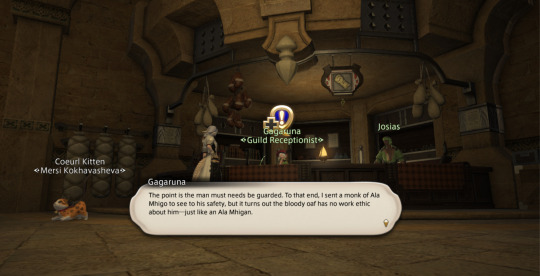
(picture sent by purplenidoqueen)
I think, unavoidably, we have to mention how much FFXIV uses race as a set dressing before the question can be answered. A great deal of the bigotry portrayed in the game and its setting is never seriously confronted. Square Enix's primary use of it is to provide backdrops for conflict or "flavor" to the world, but at very few points is resolving these inequities seriously discussed by the MSQ. Gridania is the most sterling example of it, and remains set in stone throughout the story (excluding the laughable Stormblood Carpenters' questline where you solve racism with a tea table!). Race and racism aren't themes in FFXIV; they're things that occur to drive plots.
Yenifer's story is one about diaspora; she is the victim of several great and horrible crimes committed by powers beyond her individual ability to control. The exact scale of what was lost is not something she fully understands yet, and her own relationship to her people is something that will evolve and be tested. She is, and always will be, Ala Mhigan, and that is something defined onto her as much as she defines for herself.
Yen's response to what you mentioned is going to change over the course of LF as she comes into her own and gains new understandings, both about the star and about herself. At the beginning, Yen mostly has to bottle up her own feelings for survival, obscuring her fear and anger in order to gain any amount of forward momentum. The outbursts she has stems mostly from either her having a rare position of power (which is fragile and held aloft mostly because she has yet to seriously challenge the status quo), or from her losing her temper. In the latter case, she immediately realizes how dangerous letting these feelings out is, and beats a humiliated retreat for fear of being targeted for violence. She is not, and cannot be, comfortable.
At this stage, she isn't working for the betterment of these societies; her goal is, instead, to protect her people, who are the victims of those societies. Above all else, Yen is an Ala Mhigan, and her mission is ultimately that of liberation, though she doesn't think of it that way - at least, not during ARR. She is going to view much of the existential threats posed in the first volume through the lens of them ultimately threatening her own people. This isn't to say she is stone-hearted, of course. Individual suffering matters immensely to her, because she possesses, for lack of a better term, human decency. If things were phrased more in terms of "this will be good for Ul'dah," or "this would hurt Gridanian interests," she would be significantly more apathetic. That inaction would lead to suffering and death is what stirs her to throw herself into harm's way.
Beyond this early scope, and to truly answer your question: Yen weathers it because she knows she has to, and she presses back as hard as she can with as much authority and support she can muster. Her actions alone cannot break these systems of oppression, but her confrontations of them will lead to others following suit. I think it's farer to say that, rather than Yen acting to better these societies, the societies better themselves because of her. While she will repeatedly save Eorzea and its people from destruction, the only people she frees is her own. Eorzea - and the rest of the star - frees itself.
<><><> Tidbits & Errata <><><>
While Q&A is the focus of a Yensday, I'd be remiss not to toss something of my own out there. I'm not sure if calling it an offering is wise, but it is a little amusing.
Yen's primary adventuring outfit is based around the hyur starting gear, though with some amount of modification.
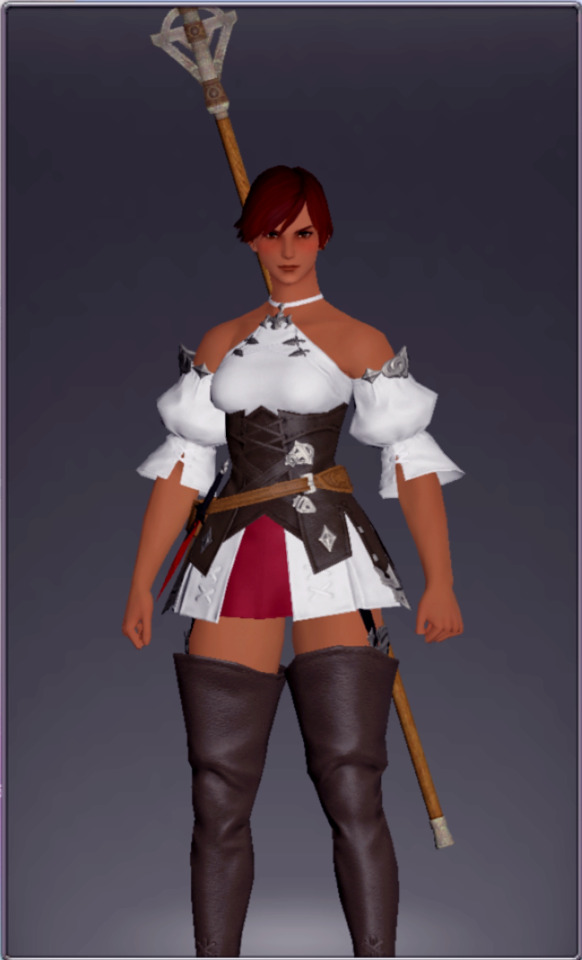
For one, she abstains from wearing the gloves that come with the outfit; this is mostly because I repeatedly forgot about them! During Gridanian Prelude's rewrite, I realized my error, and had to make a final decision, in the end opting against.
For two, the dagger that appears on the model also does not exist for Yen, initially for similar reasons (I have a bad habit of going off of memory and then needing to revisit and fix things during editing passes). However, the dagger does become a story element in White Towers, Deep Waters! In the end, it all came together rather nicely in a serendipitous kind of way.
I want to thank everyone for reading and for putting in questions! I really enjoyed having to throw all my thoughts in order, and hopefully the additional context that process created is useful and interesting to you all. Next week will be another Yensday, so feel free to start throwing questions in now!
Until then, may you ever walk in the light of the Crystal!
-H
4 notes
·
View notes
Text
Honestly I think a thing a lot of people lack when engaging in discourse and honestly complicated conflict and bad blood rooted communication with anyone (past abusers, codependent relationships, internal interactions with persecutory parts etc) is a really low grasp and awareness BEFORE HAND of what they value most and what is at the heart of what they need to be said and understood - and as a result the point of arguing and discussing fets warped around in 5000 only semi-related arguments and people - rooting their need for another topic - feel the need to double down on less important points in displaced fear of forfeiting what actually matters to them
Going into an interaction where the history is less than stellar and knowing and clearly seeing what actual hurt / anger you hold and where it stems is really important to actually having productive conversation / discourse, keeping the topic focused, and giving yourself the room to compromise WITH the other person should they also be willing to compromise.
This came to mind with the whole tulpacourse on my personal blog cause really, I value anti-racism far more than any inherent hard stance of terminology or thr group and should there be a good and genuine proposition to apply anti-racist ideology without changing terms that was actually worth giving the benefit of doubt, I'd be open to overlooking even the term discourse. To me the term is a representative of the problem, an obvious and easy starting point to make amends, but if there is an alternative to make the core thing I value (anti-racism) work that works better and more practically, I'd be willing to throw out my complaints and - given the change is actually made and followed through - completely ally myself to them on a good faith to good faith exchange.
It's why I'm generally pro-endo. I don't know shit on it, but the endo community gave us the good faith in listening to our hurt and anger about cultural appropriation and in turn, I am choosing to seperate those that have given good faith as "endos" and just shitty people as shitty people. The endo community is due good faith from me that should it be kept, my good faith will be returned to my less-informed self.
But even beyond syscourse and online discourse, this is largely how I deal with persecutors in the system and why Im a resident persecutor wrangler. I know what is and isnt negotiable and I know they are people and parts that need something themselves otherwise they would not be voicing their needs. Its a matter of helping them pinpoint what they need and then figuring out a way to have both of our needs met that we can typically defuse them.
Of course not everyones needs are compatible and that is where it is easier irl than within the system as - for irl people - you can just choose to not engage with them, block them, cut them off, ignore them etc which you really cant do as healthily within a system, but ya know, sometimes people really aren't compatible and while that usually is a matter of "unfortunate" luck...
I really don't feel unlucky OR unfortunate to say I am not compatible with racists - especially sinophobic racists - as a Chinese POC myself.
#alter: xiv#xiv rambles#communication#system dynamics#kinda syscourse so for filtering purposes#syscourse#syscourse tw#tulpacourse#tulpacourse tw#persecutor#persecutor recovery
16 notes
·
View notes
Note
Honestly the rhetoric of “Japan isn’t a perfect place” is so hollow at this point because of how obvious Japan’s societal problems are. Yes, Japan does have low birth rates, yes Japan has a harsh and unforgiving work culture, yes Japan does not have a society that reaches out to or discusses mental health of its population, creating a drive towards the growing hikikomori culture where you just stay inside your house all day and ROT. And finally, yeah many Japanese people do not like immigrants, immigration, or foreigners. This is a mix of European tourists being inconsiderate of their culture (it’s getting so bad tourists are getting banned from some districts of Japan for repeatedly taking pictures of geishas even though there are signs with visual clues of stick figures taking pictures of a geisha with a BIG CIRCLE WITH A SLASH THROUGH IT and this also applies to even simple stuff like ignoring the painted rows for getting on trains in a filed line, and a lot of little cultural divisions that you gotta learn before stepping into Asia’s biggest cultural exporter.
Of course, it’s not just the tourists, Japan also hates immigrants mostly because of the continuous cloud of Japanese nationalism that remains in the nation even after the war, which at best preserves landmarks and iconography of old imperial Japan (the naval flag hasn’t changed since 1868, even though the rising sun flag is now associated by Americans, many Chinese mainlanders, and Southeast Asians as a flag of oppression and war crimes since WWII, unless your Thailand, because Japan let Thailand keep their king and even join the Axis powers as an independent state) and at worst racism against Koreans and Chinese people that denies the terror at unit 731 and the massacre of Nanking.
Finally a lot of societal pros and cons of Japan come from 2 things:
1. America is Japan’e sugar daddy, it raised the country from rubble after WWII and created an economic miracle that modernized it so fast that by the 1980s it was developmentally ahead of countries like Italy and France.
2. Japan is dominated by one party since WWII and it only lost that majority for about 4 years after the economic crisis in 2008. It was Shinzo Abe that got the party’s grip on Japan, and economic state, back in the groove.
So Japan is a complex society with many people, a long history, complex politics (did you know Japan is one of the only countries in the global north to have a communist party represented in its parliament?) and it has problems, very human, and some of it does stem from the free-market Conservative politics of the country, and some of it was practices and cultural norms translated to the modern day.
The issue is the phrase “Japan ain’t a paradise ya know” does not address any of this, it more or less just attacks a superficial belief that people who like anime and complain about “wokeness” in western media like anime because anime generally does not explore or address social movements or political philosophy that deals with LGBTQ rights, racism, economic inequality, social justice, or political theory compared to modern american media which has integrated many more openly queer main characters and usually fights a villain who is a megalomaniac aristocrat who wants to get rid of some “other” to return society to “the good old days” and take power as this “great man” which must do what the unwashed masses could not stand up to. The assumption is since anime, and generally in genres like slice of life and shonen (and even beyond the scope of anime, tokusatsu) does not cover topic of modern political and social climate, it’s because Japan doesn’t have to deal with these issues, and is to the anime viewer, a harmonious, enriched, and bountiful society where there’s no crime, no poverty, and everyone is proud to be Japanese and accepts their place in society no matter how trivial their job or position in their community is.
The thing is: NO
Many popular anime and cartoons in Japan can cover modern social issues or political philosophy, it’s just that not all of it is going to get so popular that it gets dubbed or shipped to translation publishers like Crunchyroll or Viz media. The other thing is some Japanese media can cover older or more personal struggles in their works, it can get popular, and that’s alright! Not every piece of media that avoids talking about modern issues is anti-woke! Sometimes a fine story is a fun break from reality, a way to ease your stress from a day at work.
I think when people say “Japan isn’t a paradise you think it is” I think they’re saying that Japan has active movements that fight for more modern political causes like LGBTQ rights and economic reform, and that inevitably, they will win. Some courts in Japan are already considering same-sex marriage to be a right. That’s great.
The thing is, what the nu-fan is also saying is that the pressure of the American audience, and the growing progressive movement in Japan will reform the production and distribution of Japanese media that will introduce a new wave of authors, writers, and even animators who will be more woke than any previous generation of Japanese artists that preceded them.
And when Japan’s media landscape goes woke, where will you turn to to “escape the nu-fans” South Korea?
As if there’ll be 2 Koreas within the next decade.
🇰🇵🇰🇵🇰🇵
Then there's Western companies that are trying to ask JP creators to change, edit, and censor their works in order to fit the standards for Western audiences. If they don't try to persuade them, they do it in more subtle ways through localization without their knowledge. And they will take that advantage that the creator will be fine with it because most don't understand English or Western culture. Sites like Pixiv that is limiting US and UK NSFW content because they don't wish to change the rules for other countries for a site that was exclusively made for Japan.
It's why people are starting to accept AI translations as a new way to translate anime/manga/video games over localizers like Crunchyroll.
I also think there is a difference in addressing Japanese's political and society issues over policing their media and having to alter it in order to make a quick buck. It's just as bad as Disney removing one gay reference since it isn't part of the big plot to get dem Chinese bux. At least stuff like Apex Legends is having some balls to not LGBT+ shit for Saudi Arabia release without fear of losing money or being killed.
4 notes
·
View notes